12 to watch



These New Yorkers were among the city’s biggest in uencers in 2022, representing industries from politics to entertainment, health care to climate change, sports to transportation.
They are also key players to watch in 2023 as the city tackles big challenges including a worsening housing crisis, an existential budget de cit for the MTA and the troubling effects of climate change.
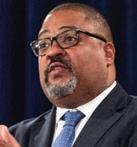
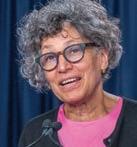

POLITICS
City Dems can’t take Asian voters for granted
On crime, education, eviction and more, Republicans are making inroads

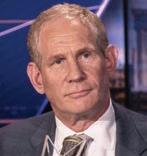
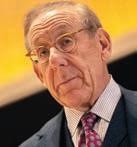


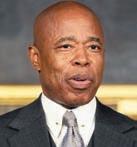

 BY ROSS BARKAN
BY ROSS BARKAN

The red wave didn’t come for America last month, but it came for deep blue New York. One factor was the sizable number of Asian Americans in Brooklyn and Queens who voted for Republicans up and down the ticket, cementing a trend that rst came into view several years ago.
It was a disturbing revelation for Democrats, who have long been the multiracial party. Asian American voters make up 14% of the electorate and are the fastest-growing demographic group in the city.
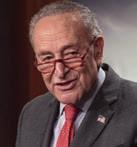
“It’s not a mirage,” said Jerry Skurnik, a veteran Democratic consultant and analyst of voting patterns. Chinese American and Korean American residents, in particular, are increasingly voting Republican, he said. “ ose voters aren’t lost forever, but Democrats have to do something to get these voters to go back to voting more heavily Democratic. It’s not like the Cubans in Miami, but [for Democrats], it’s de nitely a problem.”
Asian American voters in New York can’t yet swing citywide or statewide elections, but the interest in Republican causes was clear in last month’s gubernatorial race.
While Democrat Kathy Hochul carried the city overall, Republican Lee Zeldin inspired far more passion in neighborhoods where many working-class Chinese and Korean voters live. He dominated many heavily Chinese election districts in Brooklyn and outright won the As

ASKED & ANSWERED How “dollar” vans bene t the city’s commuters WHO OWNS THE BLOCK Developers bet hybrid workers will want a second home closer to the of ce PAGE 4 PAGE 17 GOTHAM GIGS CARING FOR COLLEGE-AGE NEW YORKERS PAGE 27 CRAINSNEWYORK.COM | DECEMBER 19, 2022 NEWSPAPER VOL. 38, NO. 45 © 2022 CRAIN COMMUNICATIONS INC.
2022 NEWSMAKERS YEARBOOK ALAMY, BLOOMBERG, BUCK ENNIS, NYCMAYORSOFFICE/FLICKR, NYSGOVERNORSOFFICE/FLICKR, SPORTSFILE/FLICKR
PAGE 13 See VOTERS on page 25
ADAMS
AGGARWALA
JUDGE
SMALLS
BRAGG
ROSS
LIEBER
SCHUMER
WRIGHT
BASSETT
HOCHUL
DEBOSE
Hochul and Adams unveil brain trust’s report: The city must reimagine its of ce districts
BY CARA EISENPRESS
Gov. Kathy Hochul and Mayor Eric Adams issued a pair of contradictory truths about New York’s economy: It is de nitely back, they said—but it needs to adopt a broad recovery strategy to bring it back in full.
Speaking at an event held by the Association for a Better New York, the elected o cials presented a plan drawn up by a panel of nearly 60 civic and industry leaders selected to suggest a way forward for the city, especially the central business districts that have not rebounded.

e plan, Making New York Work for Everyone, suggests three main areas of growth for the city: to make central business districts more vibrant and fun, to improve commutes and to broaden the population that bene ts from growth.
“Our scope had to be broader than rst imagined,” said Dan Doctoro , co-chair of the panel with Robin Hood CEO Richard Buery. Doctoro said the team rst examined areas such as Midtown and the
Financial District but realized “you can’t have a strategy for the business districts without having one for the ecosystem.”
e city has gained tens of thousands of jobs since the panel formed in May, but there are still 3% fewer jobs—and 12% fewer private-sector jobs—than in February 2020. By contrast, the national recovery hit and surpassed its prepandemic jobs number months ago.
e root cause of the slow comeback lies in the economic and cultural importance of the city’s business hubs, which generate 58.5% of citywide o ce and retail property tax revenue and 18% of property tax revenue overall.
“ is tax base powers the government spending on physical and social infrastructure that touches every New Yorker,” the plan document reads. e same business hubs represent 45% of all city jobs and 80% of all o ce space, according to the report.

Even though the large majority of business strips outside of Midtown and Lower Manhattan—from Midtown South to Forest Hills—are doing better than they were in 2020, the city itself has not been able to overcome the loss. Because of in-
REAL ESTATE
creased employer exibility about working from home and a surge in exits from the state, there simply are not as many people coming to these areas as there once was.
Copy the outer boroughs


e solution, according to the panel and the o cials, is to recast Manhattan o ce districts in the image of successful outer-borough commercial areas.
“We need to make them places people want to be,” Doctoro said. e means for this transformation will be unspeci ed changes to regulatory and zoning codes that could provide exibility to private developers to convert certain o ce towers to apartment buildings or put vacant retail spaces to use as arts spaces or child care centers.
To be sure, in the time the panel worked on its plan, the area around Grand Central—to give one example—has in fact continued to recover. Pedestrian counts rose 6.1% from May to November, and are now at 77% of prepandemic levels, according to data collected by the Grand Central Partnership. Two locations where the business group collects data, Fifth Avenue at East 38th Street and Lexington Avenue at East 42nd Street, had daily averages in November that exceeded November 2019 averages. e number of new street-level busi-
Hochul needs new plan to rebuild Penn Station: key state senator
JAN. 17
POWER BREAKFAST
BY AARON ELSTEIN AND CARA EISENPRESS
An in uential state lawmaker said a new plan is needed to rebuild Penn Station now that the Hochul administration’s existing proposal seems moribund.
“We can and must do better,” said state Sen. Leroy Comrie, a Queens Democrat who chairs the Senate committee on corporations, authorities and commissions and sits on the Public Authorities Control Board, a powerful state oversight panel.
Comrie dismissed the state’s proposal to rebuild the dismal transit hub as a “1970s plan” that fails to meet the region’s transportation needs. He said a rebuilt station must accommodate commuters so they can travel into Manhattan and then onto other destinations in the boroughs or suburbs without changing trains. He spoke last Wednesday as
part of a sponsored forum on the future of Penn Station hosted by Crain’s Content Studio.
“ is is a real opportunity to do this right,” said Comrie. “We need to lead the future of the country and not live in the past.”
He didn’t address how a properly rebuilt Penn Station should be paid for, which is one of the biggest questions about the project.
Gov. Kathy Hochul has proposed to help pay the estimated $10 billion cost of rebuilding the station with tax revenue from redeveloping the surrounding neighborhood. But the state’s development partner, Vornado Realty Trust, last month said it isn’t prepared to build towers anytime soon because the o ce market is depressed.
e Hochul administration had no immediate comment on Comrie’s remarks. At a speech last week to the Association for a Better New York, the governor said she remains

nesses being built out for retail is at its highest level since 2017.
e panel’s report included these recommendations:
● Support contentious plans already underway, including congestion pricing and Open Restaurants.
e permanent plan for outdoor dining areas stalled after the city refused to conduct a court-ordered full environmental review. Making sidewalk shed reforms is also on the agenda.
● Reduce commute times.
● Modernize libraries so that the buildings become public common spaces for remote work.
● Expand city and state child care goals to incentivize child care as an employer or government bene t.
● Add 500,000 units of housing in the city, a goal already announced by Adams, and an additional 300,000 in the state.
Hochul said that she would help provide accountability for turning the recommendations into realities, promising to check on the plan in one year. e governor said she would not hold up city goals that required state policy changes or funding.
“See how crazy that is?” she said. “We’re working together.” ■
committed to rebuilding Penn Station.
“I am not taking my foot o the pedal on that one,” she said. “ at has to happen.”
Picking up the tab
Panelists at the Crain’s event, which included both sponsor-supported and invited speakers, agreed the need for a new station is urgent.
Consensus was harder to come by when it came to who would pick up the tab or whether Madison Square Garden should be relocated so the hub, which serves hundreds of thousands of travelers daily, is no longer entombed.
Richard Ravitch, former lieutenant governor and Metropolitan
Transportation Authority chairman, said the federal government should cover 80% of Penn Station’s rebuilding cost. He said the feds have a responsibility to do so because they’re paying for new tunnels intended to bring more tra c to the station. He urged Hochul and New Jersey Gov. Phil Murphy to agree on ways to pay their respective state’s share without relying on private development “that isn’t going to happen.”
He urged the political leaders to move quickly, while the federal government is keen to invest in infrastructure and a longtime Amtrak passenger lives in the White House.
“Time is of the essence,” Ravitch said. ■
2 | CRAIN’S NEW YORK BUSINESS | DECEMBER 19, 2022 Vol. 38, No. 45, December 19, 2022—Crain’s New York Business (ISSN 8756-789X) is published weekly, except for no issue on
Crain
685 Third Ave., New York, NY 10017. Periodicals postage paid at New York, NY, and additional mailing of ces. Postmaster:
For subscriber service: call 877-824-9379; fax 313-446-6777. $140.00 per year. (GST No. 13676-0444-RT) ©Entire
1/3/22, 7/4/22, 7/18/22, 8/1/22, 8/15/22, 8/29/22 and the last issue in December.
Communications Inc.,
Send address changes to: Crain’s New York Business, Circulation Department, 1155 Gratiot Ave., Detroit, MI 48207.
contents copyright 2022 by Crain Communications Inc. All rights reserved. EVENTS CALLOUT
Mark your calendar to hear U.S. Sen. Charles E. Schumer interviewed by Crain’s Editor-in-Chief Cory Schouten. Find out how New York’s senior senator views the evolving political climate, how he gets big deals done in a divided Washington and what’s needed to keep the state’s recovery on track.
DETAILS Time: 9 to 10:30 a.m. Location: 180 Central Park S. CrainsNewYork.com/pb_schumer
POLITICS
NEED TO MAKE THEM PLACES WHERE PEOPLE WANT TO BE”
BUCK ENNIS BUCK ENNIS
“WE
ADAMS AND HOCHUL speak to business and civic leaders
HAPPY
Crain’s New York Business wishes you a peaceful and relaxing holiday season. Please visit CrainsNewYork .com for news updates; we’ll be back in print Jan. 9.
COMRIE (left) during Crain’s event
HOLIDAYS
Another boost in the fight against hunger







Bank of America proudly continues to support our employees’ health and safety while addressing food insecurity in our local communities, which typically spikes during the winter months.

Our employees are taking action to support the important work of our local food banks. For those who let us know they’ve received a coronavirus booster and/or a flu shot, we’ll donate $50 for each to a local hunger relief organization. In addition, employees can double the impact of their personal donations to fight hunger with our matching gifts program. Through these efforts, we’ll donate more than $8 million to address food insecurity in our local communities.
The team here in New York City recently presented God’s Love We Deliver, Feeding Westchester and Citymeals on Wheels with checks totaling $500,000. This contribution is in addition to our long-standing philanthropic support to help fight hunger and food insecurity across the country. We are proud to be able to help our community as we work together to move forward.
Donations in each market reflect $50 per employee who has recorded their booster, $50 per employee who has recorded a flu shot and an additional company contribution. Vaccination boosters and vaccination reporting are voluntary. Bank of America, N.A. Member FDIC. Equal Credit Opportunity Lender. © 2022 Bank of America Corporation. All rights reserved.


What would you like the power to do?
Learn more at
®
bankofamerica.com/metroNYC
José Tavarez President, Bank of America New York City
Supporting community wellness and doubling employee donations.
Developers bet hybrid workers will want a second spot to live, closer to the office
Slate Property Group buys a rental building in office-rich Midtown, hoping a refresh of its 64 apartments attracts part-time commuters
BY C. J. HUGHES
As remote work becomes the rule rather than the exception, some developers are betting that employees will want to live a few steps from their offices when they’re actually in town.
In November, for example, Slate Property Group and investors purchased an apartment building at 125 E. 54th St. near Park Avenue in Midtown, an area that many consider a business district. The firm bought the property, a 64-unit rental, for $37.7 million, or about $589,000 per unit.

Rents in the nondoorman elevator building, which is made up mostly of triplexes, have averaged $4,300 a month so far this year, according to StreetEasy. By comparison, the nondoorman average rent in Manhattan in November was $4,400, according to the Corcoran Group.

But as leases turn over in the completely market-rate No. 125, Slate is planning upgrades of the 1977 property’s kitchens and baths, which will allow the company to charge higher rents, company principal Martin Nussbaum said. For the convenience of a live-work hub, he said, tenants will pay the extra money.
“Somebody who’s in the city for only a few days and who wants to walk to work, that’s who we’re targeting,” Nussbaum said. “And there’s not a lot of competition as far as buildings like this.”
After nearly three years of working remotely, many employees expect they can come into the office only occasionally, a scenario that some employers have gradually embraced. But the trend has created an existential moment for some commercial landlords as their tenants downsize footprints amid dwindling daily headcounts. Indeed, according to Kastle Systems, offices are still only about half-full, despite rosy predictions that the pandemic’s end would bring a return to full capacity.
Against that backdrop, SL Green Realty, New York’s biggest commercial landlord, said recently that it would sell stakes in six buildings to retire debt. It has cut its dividend.
“The hybrid work model has persisted far longer than I expected it to,” company CEO Marc Holliday said.
115 E. 54TH ST.
111 E. 54TH ST.
The Brook, a private club that counts Michael Bloomberg as a member, developed this 5-story, 14,300-squarefoot structure, its clubhouse, in 1925. Delano and Aldrich, the architecture firm behind similar clubs like Union, Knickerbocker and Colony, designed the red-brick building. In 2019 the club sold air rights to MRP Realty for $9.5 million, records show. MRP, a developer from Washington, D.C., is the owner of next-door 405 Park Ave., a 1958 office building that is being demolished to make way for a new 16-story structure, records show. MRP bought the property in 2016 for $238 million. A parcel next to No. 405 at 417 Park Ave., which is owned by the developer GDSNY, has also been razed. The moves come as some landlords are calling for residential conversions amid lowered office occupancy levels.
This 5-story, 24,000-square-foot, 1920s structure was formerly the Frank Vanderlip mansion, and today is one of three U.S. locations of the Hong Kong Economic and Trade Office, a global advocacy group. On Dec. 2, the trade office hosted “Hong Kong Journeys,” a concert to honor the 25th anniversary of the Hong Kong Special Administrative Region, though the chamber-music event took place at the Upper West Side’s Kaufman Music Center. Hong Kong officials appear to have owned the building since 1998, when it was purchased from Bancomer, Mexico’s largest bank. Frank A. Vanderlip Jr., the last family member to live in the house, was an investment banker who also handled the Vanderlips’ vast real estate holdings in Southern California. His father, Frank Vanderlip Sr., a member of former President William McKinley’s cabinet, purchased the 16,000-acre Palos Verdes peninsula in 1913. In the 1950s the family sold 7,000 acres of it for suburban development.
399 PARK AVE.
A rare full-block city building, this 40-story tower was developed in 1961 at a cost of $53 million ($532 million in 2022 dollars) as the headquarters of the First National City Bank of New York. The company, now called Citibank, relocated there from 55 Wall St. in the Financial District in part to be closer to workers commuting to Grand Central from the suburbs. Since 2002 commercial landlord Boston Properties has owned the 1.6 million-square-foot tower. Tenants include financial firms, although in 2015 Citi relocated its main office back downtown to 388 Greenwich St. This year Boston Properties, which is likely struggling with empty offices as are other commercial landlords, saw its stock price plummet. Its 2022 high was $129 a share. It recently closed at $66.
Still, early predictions that offices would become extinct might have been overblown.
“The office market will not return to pre-Covid levels for some time,” Nussbaum acknowledged. “But people were writing off the office market completely, and we don’t think that was right.”
125 E. 54TH ST.
An entity affiliated with the Kalimian family sold this 15-story, 64-unit, postwar, mixed-use building, which uses 123 E. 54th St. for its apartment portion, to Slate Property Group and equity partner PCCP on Nov. 19. The Kalimians appear to be undergoing a reorganization after the 2020 death of their patriarch, Elias. Most of the units at No. 125 have three floors, and most are one-bedrooms. Slate, a 10-year-old firm, has been aggressively picking up multifamily homes as of late. In May it was also a buyer of nearby 340 E. 52nd St., a 9-story, 65-unit multifamily rental near First Avenue. One of the two storefronts at No. 125 contains Mike’s Bistro, a kosher steakhouse in a former Korean restaurant; it has more than a decade left on its lease, according to Slate’s Martin Nussbaum. The other retail space, once occupied by a bar called the Volstead, has been empty since earlier in the pandemic. Customers Bank provided $23.3 million in financing for the deal.
652 LEXINGTON AVE.
In 1872 the 1,500-seat sandstone Central Synagogue opened at this corner site, which had previously been vacant land. The German congregation relocated to the site, its fourth in New York, after outgrowing a synagogue on Avenue C. The Moorish-detailed 14,000-square-foot edifice has been a landmark since 1966. The 2016 rezoning of Midtown East allows landmarks to sell unused development rights to properties that are nonadjacent, an effort that Central Synagogue promoted; usually only next-door properties are able to transfer air rights. In 2019 the Landmarks Preservation Commission decided that the synagogue could wait to perform $3.4 million in maintenance on the aged property until its air rights were purchased, building records show, although there do not yet seem to be any takers.
135 E. 54TH ST.
Another postwar residential tower, this 16-story, 128,000-square-foot buff-brick corner site started as a rental but was converted to condos in the mid-1980s. Named Lex 54, the building has 145 residential units, ranging from studios to two-bedrooms. More than a half-dozen retail spaces line its base, mostly on the Lexington Avenue side, including several takeout joints and a branch of Bobby Van’s Steakhouse, one of three in Midtown. A downtown Bobby Van’s, across from the New York Stock Exchange, shuttered last summer. The only apartment for sale in early December, a two-bedroom, two-bath unit listed for $1.8 million, has been on and off the market since May 2021, when it came on at about $1.9 million. Lex 54 also appears to do brisk business in rentals; an unfurnished two-bedroom was being marketed at $5,800 this month.
119 E. 54TH ST.
The landlord of this 4-story, 1920s brick rowhouse also owns next-door No. 121 and two contiguous buildings in the rear, 116 and 120 E. 55th St. The Teachers Insurance and Annuity Association of America sold all four in 2005 to the State University of New York for $21.5 million, according to property records. Today the SUNY Global Center, which contains school offices as well as rentable event space, occupies No. 116, a 1927 shutter-lined Georgian landmark with original fireplaces. From 1927 to 1958, the slate-roofed No. 116 was home to William Ziegler Jr., a baking-soda magnate and real estate investor who had numerous holdings in Morris Park, the Bronx; Flatbush, Brooklyn; and Corona, Queens.
4 | CRAIN’S NEW YORK BUSINESS | DECEmBER 19, 2022
125 E. 54TH ST. WHO OWNS THE BLOCK
■
BUCK ENNIS, GOOGLE MAPS












SL Green starts planning to pivot from of ces
BY AARON ELSTEIN AND NATALIE SACHMECHI
Oce-using jobs are now at 104% of prepandemic levels, meaning there are now more roles that need to be done in an o ce than before Covid hit. Trouble is, only 60% of workers have returned to o ces owned by SL Green Realty, New York’s largest commercial landlord.
“ e hybrid work model has persisted far longer than I expected it to,” CEO Marc Holliday acknowledged at a recent conference, citing those percentages.
As a result, Holliday is trying to reposition his rm from landlord to the Manhattan o ce crowd to landlord of what Mayor John Lindsay used to call Fun City.
SL Green o cials said if their bid to build a casino in Times Square is approved, it would bene t nearby restaurants and hotels because the casino won’t be large enough to feed and accommodate everyone. A restaurant at the developer’s new 1 Vanderbilt Ave. tower was recently awarded a Michelin star, Holliday said. e rm is lobbying city and state o cials to smooth the path to
ON POLITICS
converting o ces into apartments.
In addition, SL Green is selling buildings to pay down debt and cutting its dividend to conserve cash. Its new target for 2023 funds from operations, a proxy for cash ow, is 12% below the previous Wall Street target and a painful dip for a rm that faces steep increases in bills coming due in the years ahead while hybrid work weaves itself tightly into society. Shareholders are tired of hearing that the return to o ces is imminent.
“We have a hard time seeing investors getting enthusiastic until leasing trends improve, which at the earliest is a [second-half] 2023 trend and more likely a 2024 event,” Evercore ISI analyst Steve Sakwa said in a client report.
“No sugar coating, 2023 will be tough,” added Piper Sandler analyst Alexander Goldfarb.

For sale
Next year SL Green expects to be actively selling properties to raise more than $2.4 billion in liquidity, Holliday said. e most signi cant would be its 75% stake in 245 Park Ave., an o ce building that was embroiled in a battle between the landlord and the bankrupt HNA Group of China.

e real estate investment trust is also marketing for sale part of its in-
terest in the prized 1 Vanderbilt Ave., 7 Dey St., 750 ird Ave., 110 Greene St. and 719 Seventh Ave.
It’s a challenging time for sales because some commercial real estate investors are heading for the exits. Blackstone Group recently said it would limit investor withdrawals from a real estate fund to $69 billion after a urry of requests. Starwood Capital Group shortly after noti ed investors that it was also restricting withdrawals in a $14.6 billion fund, e Wall Street Journal reported.
Manhattan’s downtown o ce market is “exceptionally slow,” Holliday said, with large blocks of space that can’t be leased at reasonable rents.
An important topic
e Real Estate Board of New York’s senior vice president of planning, Basha Gerhards, said during the presentation that some 20 million square feet of obsolete o ce space could be ripe for conversion. Holliday described o ce-to-residential conversions as “one of the
most important topics that we will be championing over the coming months and years.”
Getting there requires striking an agreement with the administrations of Gov. Kathy Hochul and Mayor Eric Adams.
Most of the Wall Street crowd wanted to know more about the casino. One analyst asked what’s Plan B if SL Green doesn’t secure a license.
“What do we do if we lose?” Holliday said. “We don’t talk about that much.” ■
City moving forward into uncharted territory to care for seriously mentally ill living on the streets
Mayor Eric Adams raised numerous alarm bells when he announced that the city Police Department and other rst responders would be deputized to forcibly remove mentally ill people from the streets and hospitalize them. State law already allows ocials to hospitalize mentally ill individuals who pose a threat to others; Adams is now going a step further, permitting the hospitalization of those who pose a threat to themselves.
e police alone won’t be tasked with this e ort, but they are a critical component. Even with new training, it’s unclear armed responders can best de-escalate scenarios that may turn violent in a matter of seconds. In 2016 a police sergeant killed a schizophrenic woman, Deborah Danner, 66, who was wielding a baseball bat in her own apartment. It was one of the city’s great and overlooked tragedies. So skepticism of Adams is warranted here. As is a degree of hope: ere are homeless, mentally ill in-
ROSS BARKAN
dividuals who desperately need hospitalization. No humane government should allow them to roam subway stations and highways. ey need health care and access to medication. ey need the supervision of doctors and mental health professionals. Consent matters. e uncomfortable reality, however, is that there are people too deep in a state of psychosis to decide whether they should enter into treatment. Mental illness can be ugly. ere are moments when only immediate intervention can keep people from killing themselves or harming others.
Decades of policy failure got us here. At midcentury there was a well-intentioned but ultimately disastrous movement to shut down psychiatric institutions. Many of them were, as portrayed in novels and lms such as One Flew Over the Cuckoo’s Nest, oppressive and debilitating. ey needed dramatic reform.
Instead, they were closed altogether, and many thousands of

mentally ill people were discharged into cities with little in the way of a social safety net to help them. Community-based services were inadequate. Rather than receive help elsewhere, a sizable number of the mentally ill ended up in state and federal prisons. America’s incarceration rate surged as its psychiatric
facilities disappeared.
New York needs many more psychiatric beds, and it will be up to state lawmakers, along with Gov. Kathy Hochul, to fund them. Patients need regular access to a ordable medication and doctors who can see them as much as is necessary. It’s not enough to do what Ad-
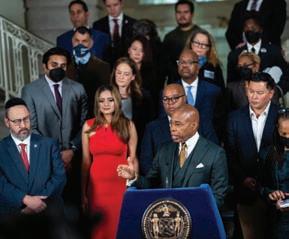
ams wants to do, but his decision is a recognition that the status quo— the enormous number of homeless, seriously mentally ill New Yorkers—is dire. Will the city’s directive make a di erence? Will there be enough resources, and will they be managed with any degree of e ectiveness? ese are the tough questions that must be asked. As the city moves forward into this uncharted territory, wariness is warranted— and maybe a little hope.
Quick takes
● Hochul has a tough budget cycle coming up in January. At stake is nothing less than the long-term survival of the Metropolitan Transportation Authority, which will face a scal cli if more revenue doesn’t emerge soon.
● Why can’t Canarsie get a ferry? e city was right to abandon one for Coney Island, which wasn’t workable for a variety of reasons, but the far- ung eastern Brooklyn neighborhood deserves a ferry of its own. e L train simply takes too long. ■
Ross Barkan is an author and journalist in New York City.
6 | CRAIN’S NEW YORK BUSINESS | DECEMBER 19, 2022
BLOOMBERG
1 VANDERBILT REAL ESTATE
HYBRID WORK MODEL HAS PERSISTED FAR LONGER THAN I EXPECTED”
ADAMS announcing the plan on Nov. 29
NYCMAYORSOFFICE/FLICKR
“THE
Scenario-based planning takes center stage for NYC companies





On the other hand, companies that cater to lower-income and highly price-sensitive customers are struggling, along with their customer base.

CRAIN’S: In times of uncertainty, customer engagement is critical. How can companies improve the consumer experience?
SANJAY RAMASWAMY EY US-East Region Accounts Managing Partner

CRAIN’S: With rising interest rates and inflation, what does the business climate look like for 2023?
SANJAY RAMASWAMY: I believe inflation has probably peaked, and we may see a return to improved business activity by the end of 2023. High interest rates have led to a sharp slowdown in deal volumes and mergers-andacquisitions activity. These rates are also cooling off commercial and residential real estate deal activity but will likely stabilize in the coming year.
Regarding inflation, we are optimistic that, barring any more geopolitical shocks, there could be more of a soft landing and a mild recession. There has been a divergent impact on businesses. Strong brands with significant market presence have been able to stay ahead of inflation by aggressively raising prices, and consumers are still spending. These organizations will likely emerge with better margins and better performance when inflation moderates.
RAMASWAMY: Ultimately, it comes down to having better data—and understanding your target audience in a more granular fashion. Knowing who your customers are, what
Whether the factors were input prices, inflation, the supply chain or the labor market, they all moved within a reasonably predictable and narrow range. Companies conducted steady-state planning and concentrated on optimizing functions for the long run.
Now all these factors have significant variations— supply-chain disruptions, wage inflation, changes to legislation and the tax code— and companies need to shift their strategies. Successful organizations will explore upside and downside ranges


the entire enterprise. It must be grounded in key business factors and connected to the company’s cross-functional operational responses. Scenario planning should happen not just at the highest level of the C-suite, but throughout the functional, end-to-end operations of the company to actually impact daily decisions. That’s where there’s a gap—and real opportunity.
CRAIN’S: Where are you seeing opportunities for growth in New York?
RAMASWAMY: The city’s economy is incredibly rich and diverse, and over the years a substantial amount of capital has poured into new ventures. We’re second only to the Bay Area in terms of money going into the entrepreneurial ecosystem, and there are a lot of opportunities across the tristate area in technology, consumer products, biotech, health care, finance and fintech. We have the critical mass, talent, educational institutions, sector ecosystems, culture and history, all of which go into making the city a uniquely special place to build world-class enterprises.
influences their purchasing behaviors and who is in their consideration set—it’s all highly valuable data that can drive strategic decisionmaking. There is a wealth of data that is available to most companies. The ones that fully leverage this data can target and improve customer engagement within minutes of an interaction.
Technology enablement is key to processing data and providing a sharper, more granular definition of the consumer segments and their choices. Leaders who recognize this potential are investing significant capital in technology and data analytics.
CRAIN’S: What will it take for companies to navigate economic turbulence?



RAMASWAMY: Before the pandemic, businesses enjoyed a period of relative stability.
of all these factors and consider how these scenarios interplay with one another. What is the maximum loss you could suffer? What can you take on in-house and where do you need outside expertise? What is the biggest opportunity in front of you? What is your appetite for risk?
CRAIN’S: How are companies engaging in scenario-based planning?
RAMASWAMY: It’s happening in bits and pieces, based on factors relevant to the business and industry. CEOs are planning for the recession, and select members of their business and functional leadership are engaged. But scenario-based planning is only being used at certain levels and in certain functions. We need to see a systematic and comprehensive approach to scenario planning through
SPONSORED CONTENT
city’s business environment has recovered steadily since the pandemic, but there are still headwinds. With
consumers, and labor shortages in many industries leaving companies short-staffed, business
planning and forecasting need to be performed in a way that reflects a
how businesses can stay
them,
The
interest rates rising, inflation putting the squeeze on both businesses and
leaders need to build unpredictability into their business models. Practices such as strategic
dynamic environment, and scenario-based planning is increasingly important. For insight to business trends and
ahead of
Crain’s Content Studio spoke recently with Sanjay Ramaswamy, EY’s US-East Region Accounts Managing Partner.
is a wealth of data that is available to most companies. The
that fully
this data can target and improve customer
within
How do you accelerate growth when the market slows? Let’s build a brighter future together. ey.com/nextyorkcity © 2022 Ernst & Young LLp. All Rights Reserved. ED None
There
ones
leverage
engagement
minutes of an interaction.
Three resolutions for city and biz leaders to help ease the housing crisis in 2023
As 2022 winds to a close, New York’s business and political leaders would be wise to adopt one very big New Year’s resolution: Make 2023 a turning-point year for housing.

ere are encouraging signs that stakeholders across ideological spectrums are beginning to appreciate the severity and urgency of a widening mismatch between population growth and new housing inventory. Rents hit record highs in 2022, and a scarcity of new units in the works to relieve that upward pressure means housing is likely to continue to be out of reach for too many New Yorkers.
e housing shortage hampers our post-Covid recovery (including a return-to-o ce push) and exacerbates the cost of doing business in an already-pricey city (workers need to earn more as housing costs skyrocket).
Fortunately, there are three big steps the city can take.
1. Turn low of ce occupancy into an opportunity.
Momentum is growing for o ce-to-residential conversions that would help create more live-work clusters set up to succeed in an emerging era of hybrid work. ese moves will
require a mix of policy changes, government incentives and private investment.
e last time New York was facing a major o ce crisis, the state enacted an incentive program that helped convert almost 13 million square feet of commercial buildings to residential buildings in Lower Manhattan.
e incentives yielded more than 13,000 new units of housing, mostly in prewar buildings, and the momentum indirectly led to the creation of an additional 17,000 units that carried no incentives.
It’s an opportunity that already has developers poking around.
Silverstein Properties, for instance, hopes to raise $1.5 billion to convert older o ce buildings.
2. Clear red tape that slows in ll housing all over the city.
Mayor Eric Adams has pledged to add 500,000 housing units in the next decade as part of his Get Stu Built plan. He’s called for a city, state and federal partnership to enact pro-a ordable housing policies.
e Adams plan lays out 111 reforms overall, 91 of which city agencies can implement themselves. Among them: exempting certain smaller housing projects from the city’s onerous environ-
mental review process, which can add eight months and a massive expense to worthwhile in ll projects.
Lawmakers in Albany must pitch in as well, delivering an e ective replacement for 421-a, which, despite its faults, delivered scores of a ordable units.
3. Rally more YIMBYs and fewer NIMBYs.
Community resistance tends to be one of the biggest impediments to getting large real estate projects across the nish line. But the tone around new projects, particularly residential ones, seems to have shifted in recent months. Commu-
Readers take issue with the state’s plan to revamp Penn Station
TO THE EDITOR: e op-ed “With new federal funding, we must seize the moment to rebuild Penn Station” was riddled with misinformation about the state’s backward plan to redevelop the Penn Station neighborhood.
Despite what Gov. Kathy Hochul and the project’s supporters would have you believe, there is no plan to x Penn Station: ere are no designs, no engineering plans, no budget. ere are only glossy renderings, nothing more.
e Empire State Development Corp. approved a plan to build 10 megatowers of commercial o ce space around the station, but it has not approved any plans to alter the station in any way. And even Empire State Development’s plan to build o ce towers has obtained only one of the many required approvals. e public is getting hoodwinked.
Furthermore, there is no federal funding for Penn Station. e state cannot apply for any such

funding—which is in abundance at the moment, and the state should be obtaining it—until there is a plan for the station (which does not exist) and both New York and New Jersey have committed to pay their share of the costs. (Neither has.)
New York hopes to fund its share of the costs from revenue generated by o ce towers built by Vornado—even as Vornado has announced it is backing away from building new towers because of the rapidly deteriorating market for o ce buildings. (Some experts are projecting a 40% decrease in the value of o ce towers by the end of this decade.) Not only does New York’s nancing plan for Penn Station make no sense, it does not exist.
Unlike what project advocates would have you believe, the governor’s plans are neither bold nor visionary. Penn Station’s depressing nature and poor layout stem from the fact it is, quite simply, a basement. We could
build a beautiful aboveground station such as Grand Central, but instead the governor's renderings of the as-yet-undesigned station are of a basement— with a skylight. Instead of creating a vibrant mixed-use district, the plan would create a concentration of luxury o ce megatowers at the expense of a ordable housing and small businesses.
New York needs a new Penn Station that meets our needs and re ects the greatness of our city. Advocates for the plan to build luxury o ce megatowers should stop misleading the public into thinking that this somehow magically equates to a new station—it doesn’t, and the people of New York deserve better.
DIANA GONZÁLEZ Campaign manager Trains Before Towers
Wrong side of history
TO THE EDITOR: One has to admire
nities are more likely to speak up in favor of housing.
e City Council approved several major developments during the fall that are poised to bring thousands of housing units to the city. Highlights include Halletts North and Innovation QNS, which combined could add more than 4,000 apartments to Astoria, as well as a 349-unit project along Bruckner Boulevard in roggs Neck.
Support from the business community should help reinforce that building more housing is not only the right thing for the city, but it’s also good for business. ■
president & ceo K.C. Crain group publisher Jim Kirk publisher/executive editor Frederick P. Gabriel Jr.
EDITORIAL
editor-in-chief Cory Schouten, cory.schouten@crainsnewyork.com managing editor Telisha Bryan assistant managing editors Anne Michaud, Amanda Glodowski
director of audience and engagement Elizabeth Couch audience engagement editor Jennifer Samuels digital editor Taylor Nakagawa art director Carolyn McClain photographer Buck Ennis senior reporters Cara Eisenpress, Aaron Elstein, Eddie Small reporters Jacqueline Neber, Natalie Sachmechi, Jasmine Sheena, Caroline Spivack op-ed editor Jan Parr, opinion@crainsnewyork.com sales assistant Ryan Call to contact the newsroom: editors@crainsnewyork.com www.crainsnewyork.com/staff 685 Third Ave., New York, NY 10017-4024
ADVERTISING
www.crainsnewyork.com/advertise sales director Laura Lubrano laura.lubrano@crainsnewyork.com senior vice president of sales Susan Jacobs account executives Kelly Maier, Marc Rebucci, Philip Redgate, Laura Warren people on the move manager Debora Stein, dstein@crain.com
CUSTOM CONTENT
associate director, custom content Sophia Juarez, sophia.juarez@crainsnewyork.com custom content coordinator Ashley Maahs, ashley.maahs@crain.com EVENTS
www.crainsnewyork.com/events manager of conferences & events Ana Jimenez, ajimenez@crainsnewyork.com senior manager of events Michelle Cast, michelle.cast@crainsnewyork.com
REPRINTS
director, reprints & licensing Lauren Melesio, 212.210.0707, lmelesio@crain.com
PRODUCTION
production and pre-press director Simone Pryce media services manager Nicole Spell
the consistency of the Building and Construction Trades Council of Greater New York, which wrote this op-ed: “With new federal funding, we must seize the moment to rebuild Penn Station.”
In 1963 it was on the wrong side of history, supporting the special permit needed to build Madison Square Garden and thus a rming the death sentence for the old Penn Station. Now, again putting self-interest ahead of the public good, and belatedly recognizing that the old Penn Station was indeed a “monument” to New York, it is supporting Gov. Kathy Hochul’s ill-conceived plan to raze an entire neighborhood under the guise of transforming Penn Station. e BCTC was wrong in 1963, and it is equally wrong today.
ANTHONY C. WOOD Co-leader
Penn Community Defense Fund
SUBSCRIPTION CUSTOMER SERVICE www.crainsnewyork.com/subscribe customerservice@crainsnewyork.com 877.824.9379 (in the U.S. and Canada). $140.00 one year, for print subscriptions with digital access.
Entire contents ©copyright 2022 Crain Communications Inc. All rights reserved. ©CityBusiness is a registered trademark of MCP Inc., used under license agreement.





chairman Keith E. Crain vice chairman Mary Kay Crain president & ceo K.C. Crain senior executive vice president Chris Crain editor-in-chief emeritus Rance Crain chief nancial of cer Robert Recchia founder G.D. Crain Jr. [1885-1973] chairman Mrs. G.D. Crain Jr. [1911-1996]

8 | CRAIN’S NEW YORK BUSINESS | DECEMBER 19, 2022
EDITORIAL
LETTERS TO THE EDITOR
BUCK ENNIS
BLOOMBERG
How to help the environment and restaurants in one fell swoop
BY ANDREW RIGIE AND ERIC A. GOLDSTEIN
Don’t take more than you need” is a concept many parents try to instill in their children from an early age. Now this common-sense wisdom is the basis of a piece of legislation picking up steam in the City Council.
Intro 559, commonly called the “Skip the Stuff” bill, would direct food-service establishments to stop including plastic utensils, ketchup, mustard, chopsticks, plates, and salt and pepper packets automatically with takeout orders. Instead, they would be provided only upon request.
Though we must be wary of overregulation, we should review each
proposal on its individual merits to determine how it will benefit or affect small businesses and the communities they serve.
There is strong support for this bill among restaurateurs and environmental advocates. It’s being championed by City Council members Marjorie Velázquez and Erik Bottcher because it will reduce the garbage that ends up on in our waste system, harms the waterways where restaurants source their seafood, and litters our streets and sidewalks, where customers dine outdoors.
If enacted, this simple legislation would eliminate millions of pieces of unwanted, singleuse, mostly plastic handouts that are now filling kitchen drawers and garbage pails every week across all five boroughs and polluting our environment.
Customers who desire any or all of these items with their takeout or-
ders would simply need to ask for them when ordering their food deliveries.
Economic benefit
The bill provides an economic benefit for operators of restaurants and other food-service establishments. When a similar “on request only” policy was adopted for takeout items in California, restaurants there reported annual savings of $3,000 or more in reduced operating costs.

It’s important to note that the bill requires third-party delivery companies to provide the ability for customers to ask for plastic utensils and condiments so restaurants can easily fulfill their request. It also directs city government to undertake a robust educational campaign to inform restaurants of the rule, then provide a warning to businesses for first-time violations, both provisions we insisted on.
City Council Speaker Adrienne Adams got behind an earlier version of this bill last year. We hope
she soon will join with Velázquez and Bottcher and the 28 other City Council members who already have signed on as co-sponsors of this legislation. Once the speaker gives a green light to a date for the full council to vote on the bill, swift passage will follow, and Mayor Eric Adams should sign the bill into law.
Enacting the Skip the Stuff bill isn’t the only thing city officials can do to help the restaurant community in its recovery. For example, the City Council must take action to establish a sensible, well-designed, permanent outdoor dining program to support local restaurants and give their customers the freedom to enjoy dining alfresco for years to come.
But now, with the holiday season
upon us, it would be a welcome gift for all New Yorkers who care about trimming back plastic pollution, reducing waste and helping our favorite restaurants save on operating expenses if the City Council passed the Skip the Stuff legislation before year’s end. ■
Andrew Rigie is executive director of the New York City Hospitality Alliance. Eric A. Goldstein is the New York City environment director at the Natural Resources Defense Council.
Veterans have always put others first. Now it’s their turn. So we created the Department of Military Liaison Services to meet the unique needs of vets and their families.
Find out more at RaiseHealth.com
HELPING VETS WIN THE BATTLE FOR BETTER HEALTH

December 19, 2022 | crAIN’S NeW YOrK bUSINeSS | 9
BECAUSE WELL CAN’T WAIT
Write us: Crain’s welcomes submissions to its opinion pages. Send letters to letters@CrainsNewYork.com. Send op-eds of 500 words or fewer to opinion@CrainsNewYork.com Please include the writer’s name, company, address and telephone number. Crain’s reserves the right to edit submissions for clarity.
OP-ED
“SKIP THE STUFF’’ WOULD eLImINATe mILLIONS OF PIECES OF PLASTIC ISTOCK
ACCOUNTING
Grassi Advisors and Accountants

Grassi is proud to announce that the rm has added Hassan Khan, a nationally-recognized Technology Consulting Partner, to lead the rm’s Technology Advisory Practice. To this role, he brings 20+ years of experience in Technology Assurance, Operations & Business Process Optimization, Strategy & Governance, Risk Analysis, Offshoring, and Enterprise Intelligence.



CONSULTING
CMW Strategies


Robert F. Goldrich has joined CMW Strategies as the rm’s Senior Vice President for Strategic Initiatives. Rob comes to CMW with a three-decadelong career in nance, economic development, government and philanthropy. Rob was a Senior Policy Advisor in Economic Development in City Hall during the Bloomberg Administration. He recently served as the President of the Leon Levy Foundation and was previously a Principal at Morgan Stanley in NYC and Hong Kong and Managing Director at Credit Suisse.
FINANCIAL / TECHNOLOGY
Beam

Beam – the end-toend platform that streamlines equitable public bene t administration –announced two new technical leaders to further its mission to reimagine the social safety net.

Victor Garcia, former Senior Director of Software Engineering at the Walt Disney Company, joins as Beam’s Vice President of Engineering and Emilio Tamez, former Data Scientist for Duolingo, Meta, and Spotify joins as Director of Data and Analytics. Victor and Emilio will strengthen Beam’s partnerships with local agencies to provide nancial assistance across a range of programs, from rental relief to utility bene ts to emergency cash assistance, in a single automated system. Since 2020, Beam has administered over $180 million to 300,000 U.S. households.
LAW Hodgson Russ LLP




Debra Silverman


Herman, a partner in the Hodgson Russ State & Local Tax Practice, has been elected as a Fellow of the American College of Tax Counsel. She has over 20 years of experience representing clients in state tax audits and New York State and New York City tax litigation and is widely recognized for her experience in state and local taxation. Debra is also currently the chair of the American Bar Association Tax Section’s Committee on State and Local Taxes.
NONPROFIT




Police Athletic League

The Police Athletic League (PAL) announced in November 2022 that Bart M. Schwartz, who has been actively working with PAL for 13 years, will become its new President effective January 2023. Mr. Schwartz has served on PAL’s Board since 2009 and will take the role currently held by David Arena who has been the organization’s President of the Board since 2016. PAL is one of New York City’s largest independent not-for-pro t youth development organizations.
INFORMATION TECHNOLOGY












Electric Yotam Hadass has been named Chief Technology Of cer at Electric, stepping up from SVP Engineering. Yotam brings two decades of software development experience and engineering leadership. In his new role, he will oversee Infosec, Internal IT, Product and Design -- in addition to Engineering. His teams are responsible for product delivery that makes IT easy for Electric’s 55,000 users.
LAW
Hodgson Russ LLP







William S. Turkovich has been named leader for the Hodgson RussLLP Federal & International Tax Practice. Bill concentrates his practice on federal and international tax law matters, including guiding Canadian and other non-U.S. clients on U.S. tax matters. He has comprehensive experience advising clients on business expansion into the United States, structuring considerations in purchasing U.S. real estate, and the tax implications of relinquishing U.S. citizenship or residency status.

TRANSPORTATION
Vantage Airport Group

Eileen Hanson joins Vantage Airport Group’s corporate leadership team as Vice President, Marketing. In this newly created role, Ms. Hanson will lead comprehensive, multi-year marketing and brand strategies to support Vantage’s corporate growth goals, including the $4.2 billion development of Terminal 6 at John F. Kennedy International Airport, now underway. Hanson brings industry leading experience in marketing, strategic partnerships, and community engagement.

FINANCIAL SERVICES

Santander Bank, N.A. Santander Bank, N.A. has appointed Donna Cleary to Market Manager for New York City and Long Island, where she will be leading a team focused on providing solutions to middle market companies in the region. Cleary brings her customer-centric approach and passion for building inclusive and high-performing teams to this newly created role. Cleary has been with Santander for four years, most recently serving as Head of Underwriting & Portfolio Management for the Commercial Bank.
LAW
Farrell Fritz, P.C.
Ryan C. Hild has joined Farrell Fritz as a Partner in its Tax Certiorari & Condemnation Group.



After spending sixteen years at Koeppel, Martone & Leistman, a leading Tax Certiorari law rm, Hild joins former colleague Michael P. Guerriero to continue to expand the practice at Farrell Fritz. His arrival will support the rm’s collaborative efforts representing property owners, commercial tenants and developers throughout the region.

10 | CRAIN’S NEW YORK BUSINESS | DECEMBER 19, 2022
To place your listing, visit www.crainsnewyork.com/people-on-the-move or, for more information, contact Debora Stein at 917.226.5470 / dstein@crain.com Advertising Section
PEOPLE ON THE MOVE
SHARE YOUR COMPANY’S JOURNEY Feature your latest milestones, launches, partnerships, awards and more in Crain’s For more information, contact Debora Stein at dstein@crain.com or submit directly to CRAINSNEWYORK.COM/COTM
ADVANCING THEIR CAREERS Recognize them in Crain’s
contact
or submit directly to CRAINSNEWYORK.COM/PEOPLEMOVES
INDUSTRY ACHIEVERS
For listing opportunities,
Debora Stein at dstein@crain.com
Garcia Tamez
To avoid overcorrection, City Hall pushes measured approach on of ce-to-residential conversions
BY C. J. HUGHES
Tumbleweeds may be blowing through commercial buildings, prompting calls to turn some of the millions of square feet of unused o ces into apartments.
But not so fast with the conversions, says City Hall, which seems to believe that o ce buildings still have a major role to play.
“We have to make sure we are not overcorrecting in any of the districts that are hubs of activity but are really planning for the long term,” said Maria Torres-Springer, the deputy mayor for economic development, during an interview hosted by Crain’s on Dec. 8 in Midtown.

Mayor Eric Adams’ administration has “a goal of ensuring that our central business districts are vibrant, dynamic, 24-7, mixed-use districts,” Torres-Springer said. e o ce- lled areas shouldn’t be “places where people have to go, because they work there, but truly places where they want to go.”
e deputy mayor’s comments, delivered in front of an audience of real estate and nancial executives, seemed to be a slight pushback


against a growing chorus of pro-redevelopment voices eager to make housing out of obsolete boardrooms.
In fact, the Real Estate Board of New York, the in uential trade group, recently said that 20 million square feet of o ce space could be ripe for conversion. REBNY’s estimate would seem able to support at least 20,000 new apartments, even if some sites do not easily lay out as housing because of inoperable windows and other construction challenges.

Landlords would also likely seek generous tax abatements for any conversions, which Torres-Springer seemed to acknowledge when saying that City Hall was looking into possible “incentives.”


Different tune
After initially downplaying the threat the work-from-home trend posed to their portfolios, commercial landlords now seem to be singing a di erent tune.

Indeed, SL Green Realty, the city’s largest private owner of o ce space, said recently that occupancy levels of just 60% in its portfolio would now force the company to





sell stakes in six buildings.
Between 2010 and 2020, the city gained 630,000 residents but created only 200,000 homes, an imbalance that cannot continue, Torres-Springer said during the Power Breakfast as she struck a strong pro-development tone about addressing the housing shortage.

“Finger-pointing, hand-wringing and pearl-clutching about development in neighborhoods [have] to end,” she said, “if we are to make a dent in the issues of the city that are


most pressing and that we can no longer postpone.”
Affordable housing
Shortly after the event, the mayor announced the administration’s Get Stu Built plan to tackle the city’s a ordable housing crisis. e plan consists of more than 100 actions to cut red tape and incentivize developers to build “faster, smarter and cheaper” housing. e goal of the plan is to build 500,000 homes in the next decade, Adams
GIVE GREAT
RECOGNITION CIOS THE THEY DESERVE

said.
e mayor has faced criticism this year for not including speci c numbers in his announcements related to a ordable housing.

Small housing projects will be exempt from the environmental review process under the new plan. e mayor said he believes that including them would increase the overall cost of housing and that cost is passed on to residents. e plan introduces a Zoning for Housing Opportunity amendment that seeks to ease the conversion of underused buildings to create housing.
For her part, Torres-Springer acknowledged the depth of the housing crisis. More than 50% of New Yorkers are rent-burdened or spend more than 30% of their income on housing, and 60,000 people, mostly women and children, live in shelters each night, Torres-Springer said, adding that the vacancy rate for apartments at less than $1,500 a month is “functionally zero.”
“ is crisis is real. It is acute. It is chronic. And we can no longer postpone action to really change its trajectory,” she said. ■


DECEMBER 19, 2022 | CRAIN’S NEW YORK BUSINESS | 11
CONGRATULATIONS TO THE 2022 NEW YORK CIO ORBIE® WINNERS
Presented by VMware
MICHAEL W. SMITH LEADERSHIP AWARD
Presented by Twilio
LIDIA FONSECA SUPER GLOBAL ORBIE
Presented by Dell Technologies
BRIDGET ENGLE GLOBAL ORBIE
Presented by Tata Consultancy Services
LOOKMAN FAZAL LARGE ENTERPRISE ORBIE
TM
Presented by SoftServe
ANNA RANSLEY ENTERPRISE ORBIE
Presented by Workato
SHANE BRAUNER CORPORATE ORBIE
CLAUS T. JENSEN HEALTHCARE ORBIE
Presented by Fortinet
CRAIN’S POWER BREAKFAST
BUCK ENNIS
CRAIN’S reporter Aaron Elstein (left) with Deputy Mayor Maria Torres-Springer
SULAIMAN “SU” SANNI
INTERVIEW BY CAROLINE SPIVACK
Dollaride
When Su Sanni worked on Wall Street in 2008, his commute began and ended with a trip in a “dollar” van. The bus he needed to get to Jamaica station was crowded and arrived infrequently. So for $2 he’d hop on one of the hundreds of minibuses that make up the city’s loosely organized commuter van industry and ride to the station, where he’d transfer to Manhattan. Sanni’s experience aligns with the more than 120,000 people each day who rely on the vans. That’s part of why, in 2017, he created Dollaride, an app that allows users to see where nearby licensed vans are operating. He says industry innovation and support from the Adams administration can help more New Yorkers access van services.
For the uninitiated, what are dollar vans, and what purpose do they serve?
The term dollar vans represents a network of commuter van drivers who operate along fixed routes, mostly right now in Brooklyn and Queens. They’re important because they connect people who live in areas that don’t have great access to public transit.
Dollaride leverages technology to make commuter vans more accessible. How can the industry take greater advantage of tech?
DOSSIER
WHO HE IS Founder and CEO, Dollaride AGE 38
GREW UP East New York, Brooklyn RESIDES Bedford-Stuyvesant, Brooklyn EDUCATION Bachelor’s in psychology and master’s in business management, Boston College

FAMILY BUSINESS Sanni’s family has a three-decade-long history of operating commuter van fleets. Two of his uncles got their start as drivers in the 1980s, when they first arrived in the U.S. from Nigeria.
ATHLETIC PAST Sanni, who did not play football in high school, played cornerback and safety for the NCAA’s Division I Boston College Eagles. His athletic prowess earned him a scholarship that paid his way through undergrad and graduate school. He briefly considered pursuing a professional career in the NFL before deciding that it wasn’t for him.
A good example would be insurance. Commuter vans for a decade now have complained about how they have very few options for commercial insurance, and that the few options are very expensive. Fundamentally, when you look underneath the hood, you’ll find that there’s different insurance models that

could be applicable to commuter vans that would be a lot more affordable. But those models require there to be a lot more visibility into the whereabouts of the drivers and who they’re picking up as well as how many people are in their vehicles. You can actually accomplish that level of visibility if there was technology that was counting passengers or keeping track of the drivers’ geolocation and then funneling that data to insurance carriers. That’s one example. But there’s a lot of them.
A state bill to legalize street hails for commuter vans has support from the Adams administration and the City Council. What would being able to legally pick up street hails mean for the industry?
In a more practical sense, to riders it should make it easier to use a commuter van. But more specifically, it would mean the drivers of commuter vans can now operate without the fear or harassment of police and [Taxi & Limousine Commission] enforcement. Overall, I think it’s a great thing that this is a bill that’s gaining traction on the city and state level.
Dollaride recently received $10 million from the state to help electrify the industry. What are the challenges there?
Some of the challenges include identifying and then installing sufficient charging infrastructure. That’s part of the work that we’re going to be doing, funded by [the New York State Energy Research and Development Authority]. Another challenge is educating the public as well as drivers and fleet owners on the benefits of using an electric vehicle as opposed to a gaspowered vehicle. Simply put, you eliminate the cost of fuel by eliminating gas. I see going electric as a way to just put money back in people’s pockets. ■
12 | CRAIN’S NEW YORK BUSINESS | DECEmBER 19, 2022
INAUGURAL
Crain’s New York Business is looking to honor women-forward organizations and individuals who are leading by example and promoting ongoing change in the business community. Nomination Deadline: January 13 CrainsNewYork.com/WomenofInfluence
CRAIN’S
WOMEN OF INFLUENCE AWARDS
ASKED & ANSWERED
BUCK ENNIS
The New Yorkers to watch in 2023
Slow-going infrastructure upgrades to prepare city for climate change set to accelerate in 2023
It seems fitting that the city’s chief climate officer is one of this year’s top newsmakers.
As commissioner of the Department of Environmental Protection, Rohit Aggarwala is the chief architect behind the Adams administration’s coastal and in-land climate plans. The city is pouring funds into resiliency projects, green infrastructure and stormwater protections, and Aggarwala is one of the key voices in guiding those initiatives.
But many of the long-term projects, some of which were first envisioned during the de Blasio administration, remain stuck in a web of bureaucracy. Perhaps the biggest challenge is that, in Aggarwala’s words, “government is working much more slowly than it can.” The department has committed to upgrading the city’s outdated stormwater infrastructure, for example, but it’s slow-going, expensive work.
Aggar wala and other climate leaders in the city are therefore looking to match the long-term efforts with short-term sealers—Band-Aid projects, as the commissioner describes them—that will help at-risk communities cope until more can be done.
Mayor takes tentative steps to bring the city back for business
With New Year’s confetti still sprinkling across Times Square, Eric Adams started the year being sworn in as the city’s new mayor. The former police captain won the mayoral race on the premise that crime in New York was out of control and that he was the person to fix it. He courted small businesses, especially those in the outer boroughs, by explaining how he would take their operating and regulatory concerns to heart in directing policy. He made headlines by embracing cryptocurrencies (the mayor converted his first three paychecks into Bitcoin and Ethereum through Coinbase) and vowing to leave his mark on the city’s tech industry.
But a year after becoming mayor, it’s hard to say the self-described “get stuff done” mayor has actually done all that much. Crime is still up and the city’s economic recovery from Covid-19 lags the rest of the country.
That’s not to say the mayor hasn’t dug in on many issues.
As one of his first acts, Adams vowed to cut red tape for businesses. The city later announced it would repeal or reduce penalties on, or add firsttime warnings to, more than 100 regulations.
In March the mayor laid out his business-friendly economic blueprint for the city, including expanded promotional campaigns, new zoning regulations, and an interagency task force dedicated to improving the public space within commercial corridors.
Adams backed the efforts of his housing authority chair—who predates him—along with legislators in Albany to create a trust to fund public housing, potentially unlocking new revenue to address tens of billions of dollars in capital needs.

In October the mayor teamed up with Gov. Kathy Hochul on an initiative to flood the subway with more police officers and install surveillance cameras. The following month he unveiled a plan that charges police, emergency medical responders and outreach workers to involuntarily transport individuals to the hospital for a psychiatric evaluation if they show signs of a mental illness that makes them unable to meet their basic human needs.
Some New Yorkers seem disenchanted with Adams. City workers are quitting because he won’t allow remote work, and his willingness to empower political cronies at the expense of seasoned experts appears to be catching up with him. It remains to be seen whether his ambitious Get Stuff Built plan, which includes the construction of 500,000 affordable units, will help remedy the city’s housing crisis. ■
“We will not be able to change our infrastructure as fast as the climate is changing,” he said during a City Council hearing earlier this year. “The reality is that heavy construction takes time, and public engagement takes time and sound planning takes time. So even if we operated under pandemic-like emergency procedures, it would still take a long time.”
These Band-Aid solutions include a DEP rule completed in January that requires all newly developed or renovated properties to keep their stormwater out of
Coronavirus
an ambitious new climate law, Local Law 97, that targets buildings’ emmissions, although several key questions remain about it.
In the years to come, Aggarwala will look to push those long-term plans to become a reality and eventually make the short-term solutions a thing of the past. ■

remains a concern, joined by mpox
Before becoming health commissioner on Dec. 1, 2021, Bassett was commissioner of the city Department of Health and Mental Hygiene. She guided the city through outbreaks of Ebola and Legionnaires’ disease, among other major health events between 2014 and 2018.
In the past year Bassett has had to contend with the pandemic—the effects of which have reverberated around every corner of the city—as New Yorkers returned to schools and offices. The state and city health departments also launched a wastewater sur veillance network this year as polio emerged in Rockland County and Bassett declared New York was in a state of emergency. During the summer, when the mpox virus broke out, Bassett helped the state respond—cases have fallen drastically—and followed the World Health Organization in changing the virus’s written name from “monkeypox” to “mpox” to lessen any potential stigma attached to it.
On Jan. 1, just over a year after assuming the role of state health commissioner, Dr. Mary Bassett will step down.
Bassett is headed back to the Harvard Chan School of Public Health, where she previously was FXB Professor of the Practice of Health and Human Rights in the social and behavioral sciences department. But, Bassett said, she’ll always be a New Yorker.
So what’s next for Bassett? Her precise role at Harvard is unclear right now, but in a statement issued Dec. 2, she said she was leaving so the next commissioner could have four years at the helm of the state Department of Health.
“I look forward to cheering on the department’s accomplishments in the coming years,” she said. ■

December 19, 2022 | crAIN’S NeW YOrK bUSINeSS | 13 NEWSMAKERS 2022
the city’s sewers. The Adams administration also rolled out a new Rainfall Ready NYC action plan this year to make the city better prepared when flooding does hit, including providing sandbags and inflatable dams to businesses and landlords. Pressure is mounting for the city to strictly enforce
NYCMAYORSOFFICE/FLICKR
Crain’s will be keeping close tabs on these 12 for signs where the city’s economy is headed next year
SPORTSFILE FLICKR GOVERNORKATHYHOCHUL/FLICKR
PROFILES BY JACK GRIEVE
ERIC ADAMS, New York City mayor
ROHIT AGGARWALA, NYC chief climate officer
DR. MARY BASSETT, State health commissioner
— JACQUELINE NEBER
Manhattan DA tempers social justice docket
Alvin Bragg made history in January, when he took office as the first Black Manhattan district attorney.
Within days he was making headlines.
In a Jan. 3 memo to staff, “Achieving Fairness and Safety,” Bragg, a former federal prosecutor, stated his intention to reduce both incarcerations and pretrial detentions. He announced that certain robberies, assaults and weapons-possession cases would not be prosecuted as felonies.
Bragg’s message: Only the most serious crimes will lead to jail time.
Critics quickly pounced on Bragg’s desire to lower incarceration rates at a time when the city is experiencing a rise in violent crime. The city’s police commissioner, Keechant Sewell, for example, said Bragg’s policies could put officers’ safety at risk.
Bragg later walked back his remarks and said New Yorkers were “understandably” left with the wrong impression that his office would not enforce the city’s laws against certain violent crimes.
A month after taking office, he faced the abrupt resignation of the two leading prosecutors in the office’s criminal case against former President Donald Trump’s real estate company. The prosecutors cited Bragg’s hesitation about moving forward with the case. That decision was “misguided and completely contrary to the public interest,” one wrote in his resignation letter. The district attorney later recommenced the probe.
In the fall Bragg announced the creation of the first housing and tenant protection unit, dedicated to tackling systemic, structured and organized criminal activity among landlords and developers. Within a week the unit indicted six real estate developers on charges of defrauding the 421-a affordable housing tax abatement program of more than $1.6 million across six Brooklyn buildings.
To combat a wave of retail theft that has surged in some of the city’s premier shopping districts, Bragg’s office released a five-point plan to improve coordination with the Police Department and local businesses and build out a new retail theft investigations unit. The plan includes prioritizing the prosecution of recidivists and funding support services that use a peer engagement model for individuals at risk of turning to crime.
As for what's next, Bragg laid out his priorities in a recent op-ed, emphasizing gun enforcement, cracking down on hate and sex crimes, and combating retail theft. ■
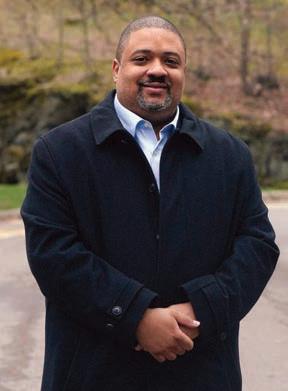
Kathy Hochul made history in 2022 when she became the first woman elected to New York’s highest office. In a tighter-than-typical race for New York governor, she held off Republican opponent Rep. Lee Zeldin and earned a full four-year term.
Hochul completed her rise from working class beginnings in Buffalo to the executive mansion in Albany last year, after former Gov. Andrew Cuomo resigned amid a sexual harassment scandal. Now, with an election victory, she has an opportunity to govern with a mandate from voters.
In the course of the campaign, Hochul collected the support of every major elected Democrat and most of the labor unions in the state. Business leaders and wealthy donors contributed to the $49 million she raised for her election, a new record for New York.
Hochul’s lead shrunk in the weeks leading up to the election, however, forcing a frenzied response that included appearances by Democratic A-listers President Joe Biden, former President Bill Clinton and former Secretary of State Hillary Rodham Clinton.

What’s next? Her campaign strategy of running as an incumbent with a wide lead until near the very end offered little insight. She’s expected to crack down on the proliferation of handguns and keep abortion clinics funded. She may face additional pressure to chip away at the criminal-justice reforms passed in 2019 and demonstrate to the electorate she is addressing crime. She’ll have to confront the state’s housing crisis that’s rippling from the city into the suburbs. It will also be up to her, with the Legislature, to figure out how to fix the strapped Metropolitan Transportation Authority.
The good news for Hochul is she’ll be able to do this now minus the election noise. ■
Ariana DeBose had a big year.
She won her first Oscar in 2022 for best supporting actress for her portrayal of Anita in Steven Spielberg’s adaptation of West Side Story, making her the first Afro-Latina to be nominated and win an Oscar in an acting category. She hosted this year's Tony Awards, appeared at the White House for a state dinner and performed at the national Christmas tree lighting ceremony in Washington, D.C.

DeBose’s success didn’t happen overnight. She spent years in Broadway ensembles in shows such as Hairspray and Hamilton. When Broadway reopened after a year-and-a-half pandemic pause, these background performers took center stage,
New York Yankees outfielder Aaron Judge made baseball history this year with his 62nd home run of the season, surpassing the American League record of 61 that Roger Maris—who also played for the Yankees—set in 1961.
Judge has been the face of the Yankees’ storied franchise since 2017, and his home-run chase this year solidified his place as a fan favorite. Judge in December re-signed with the team for $360 million over nine years. It’s the largest annual payout ever for a position player. The Yankees’ crosstown rivals, the New York Mets, gave pitcher Max Scherzer the biggest per-annum deal in baseball history ahead of the 2022 season with a $43 million salary.
The 30-year-old Judge had previously rejected a seven-year, $213.5 million contract extension from the Yankees before the start of the 2022 season. The California native had been courted by several teams, including the San Francisco Giants and the San Diego Padres.

Even with Judge’s historic season, the Yankees drew about 180,000 fewer fans this year than in 2019. But that doesn’t mean the team is struggling financially. The Yankees ranked 62nd on this year’s Crain's list of the largest privately held companies in New York. Forbes estimates the Yankees are the first baseball team to be worth $6 billion. If that’s correct, it means that since George Steinbrenner became the team’s owner in 1973, the Yankees have generated a compounded annual return of nearly 18%.
Ticket revenue is down, but that might not matter so much as long as revenue from other sources continues to grow. Sports betting, for example, is offering new opportunities for teams, although baseball fans don’t bet as often as football fans do. Starting next year, players will wear patches on their jersey sleeves with sponsor logos as a new source of advertising revenue. ■
14 | CRAIN’S NEW YORK BUSINESS | DECEmBER 19, 2022
NEWSMAKERS 2022
BLOOMBERG
Now elected, Hochul will define housing, criminal justice, MTA agenda
ALAMY ALAMY GOVERNORKATHYHOCHUL/FLICKR
Judge remains the face of storied Yankees, as team’s value soars
NEW YORKERS WERE “UNDERSTANDABLY” CONFUSED BY HIS MEMO
”ROSE
CAMPAIGN
OFFERED
Wrapping up a breakthrough year for Broadway star HER
GARDEN”
STRATEGY
LITTLE INSIGHT
ARIANA DEBOSE, actress
JUDGE, New York Yankees
AARON
KATHY HOCHUL, governor
ALVIN BRAGG, Manhattan district attorney
turned Hollywood sensation


helping keep things running through challenging conditions. With her newfound prominence, DeBose helped celebrate these performers and drew new attention to Broadway.
It couldn’t have happened at a better time. Tourists are returning to the city, as evidenced by a steady increase in hospitality jobs. The first-of-itskind Museum of Broadway opened in Times Square, and the Lincoln Center TKTS booth reopened after a two-year hiatus. Visitors to the city this winter will find that a full slate of shows awaits them.
What’s next for DeBose? She is set to star in a number of upcoming films, including Amazon Video’s House of Spoils and Disney’s Wish. ■
Consequences loom as the MTA scrambles for much needed funding
New York’s public transit is headed for a fiscal crisis: The Metropolitan Transportation Authority expects it will have to plug $2.5 billion in budget shortfalls by 2025, and revenue solutions need to start soon or there will be service and staff cuts.

Janno Lieber, the agency's chair and CEO, is leading the survival effort.
Most crucial is the MTA’s bet that it will receive $600 million in new government funding—likely a mix from city, state and federal lawmakers.

The agency is getting creative in rolling out several measures that could boost efficiency and balance its operating budget beginning next year. Savings could come through new technology: predictive artificial intelligence, for example, to repair buses before costly breakdowns. Capital dollars could be invested in infrastructure upgrades for long-term saving: replacing older nonpassenger trains, for instance, to reduce maintenance expenses. Transit officials aim to curb fare evasion by deploying unarmed guards at 12 subway stations to deter misuse of emergency doors— where more than 50% of fare evasion occurs.
But Lieber has been clear. If state and federal lawmakers do not create new revenue sources for the system, major cuts to service and construction projects will happen—and the consequences of those rollbacks will be obvious to commuters in the quality of their rides.
To complicate matters, the average weekday ridership on the subway and buses has stubbornly hovered around 60% of prepandemic levels. The authority is missing out on $200 million a month in fare and toll revenue compared to 2019’s figures. The MTA largely attributes this to the rise of remote work. Safety is also a major concern, especially with two high-profile violent attacks on subway platforms this year that shook the confidence of riders. Lieber has described the moment as one of “great uncertainty” for the authority.
“We want to make clear today that that discussion needs to unfold sooner rather than later,” Lieber said. “That our recommendation is not to careen the can 100 miles per hour toward the fiscal cliff, but rather to come up with a plan now that makes sure that riders can count on the system.” ■
Employees unite and list demands amid workplace uncertainty, union drives
Employees are demanding more out of corporate America, and many in New York got what they asked for in 2022.
On April 1 workers at an Amazon warehouse on Staten Island voted to unionize, the first location within the company in the U.S. to do so. That same day employees at Starbucks’ flagship store in Chelsea voted to unionize. Four weeks earlier, workers at the SoHo location for outdoor apparel retailer REI voted to create the only union at the company.
The union boom has spread to digital media companies (including Condé Nast and The New York Times); museums (the Brooklyn and Whitney museums are two recent additions); and at tech companies (more than 600 Google employees and contractors unionized in the past year).
Among workers who already have contracts, more than 30,000 doormen, superintendents and other building employees negotiated a new contract with building owners after their union authorized a strike if a deal was not reached.

Labor leaders say treacherous working conditions amid the pandemic, along with a swell of job openings, have empowered more employees. “The top priority is to achieve what we deserve for being essential workers during the past two years and going forward,” said Manny Pastreich, secretary treasurer of Local 32BJ of the Service Employees International Union.
New York ranks first in union density among the country’s largest states, with a unionization rate of 22.4%, more than double the U.S. average (10.6%) between 2020 and 2021, according to the City University of New York Center for Labor and Urban Studies. More than a fifth of all wage and salary workers who live in the five boroughs are union members, the report found.
This is “the most exciting moment in many decades for organizing, not just in New York but around the country,” said Ellen Dichner, a labor lawyer and distinguished lecturer at CUNY’s School of Labor and Urban Studies. ■
December 19, 2022 | crAIN’S NeW YOrK bUSINeSS | 15
NEWSMAKERS 2022
NEWSCOM
MTA/FLICKR
WHAT’S NEXT FOR DEBOSE? SHE’S SeT TO STAr IN A NUMBER OF UPcOmING FILmS
outfielder
JANNO LIEBER MTA CEO
NEWSCOM
CHRIS SMALLS AND PROTESTERS, Labor Organizations
Schumer coasts to fifth term after delivering raft of legislative victories
For Senate Majority Leader Chuck Schumer, 2022 was one of the most consequential years in his decades-long career. Not only did he spend much of his time meticulously strategizing to keep together the Democrats’ no-vote-tospare majority, but he also brought much-needed federal funding home to New York.
Ross looks
to bring a housing project to Queens and a casino
to Hudson Yards
Stephen Ross is not new to making news in New York.

The Related Cos., which Ross formed in 1972, is behind the development of the Time Warner Center and Hudson Yards. Its work has spanned the city, from the Bronx Terminal Market near Yankee Stadium to Willets Point in Queens. It also operates one of the largest portfolios of rental buildings in the city, many of which include both luxury and affordable housing.
In September The Related Cos. announced a partnership with gaming hospitality giant Wynn Resorts to bid on a license for a casino in Hudson Yards. If a license is secured, their casino would go next to the Javits Center in the western rail yard, the second phase of the company’s 28acre Hudson Yards development.
THE CASINO WOULD GO NEXT TO THE JAVITS CENTER
The state’s Gaming Commission plans to award up to three licenses for casinos in New York, and Mayor Eric Adams has asked for at least two of them to be for projects in the city. Related’s partnership with Wynn was the first such deal to go public, although SL Green has since partnered with Caesars in a bid to open a Times Square casino. No casinos with gaming tables exist in the boroughs, but the licenses will allow for that.
Beyond the casino bid, Ross’s real estate giant also recently filed plans with the Department of Buildings for its massive and long-awaited project in Willets Point. Its overall plan for the neighborhood is to build a mixed-use complex with three buildings containing 1,100 affordable housing units, a public school, community space and open space across 6 acres.
Ross is active across a spectrum of civic and cultural institutions in the city, including with roles on Lincoln Center’s executive committee and as a trustee of New York-Presbyterian Hospital. He owns the Miami Dolphins football team, although he was suspended in August for violating the league’s anti-tampering rule. He has donated more than $300 million to his alma mater, the University of Michigan, making him the school’s largest donor. ■
The year prior was chock-full of legislative victories for the Democrats. In March 2021 they passed one of the largest federal relief packages ever assembled, the $1.9 trillion American Rescue Plan Act. Schumer that November helped push through President Joe Biden’s $1.2 trillion bipartisan infrastructure bill, which included $10 billion alone for the Metropolitan Transportation Authority and nearly $60 billion for regional Amtrak service.
Things looked less promising for Democrats going into 2022. Schumer and his Senate majority were increasingly at odds with Sens. Joe Manchin and Kyrsten Sinema. Manchin effectively killed the president’s Build Back Better effort, and Sinema slashed Democrats’ hopes of sidestepping the filibuster to pass the first voting rights protections in decades.
Largely at the hands of Schumer, though, the apparent gridlock in the caucus did not last long.
In June, just a month after a deadly shooting at a Buffalo supermarket, the Senate approved bipartisan gun-safety legislation that was hailed as the biggest breakthrough on the issue in three decades. Congress reauthorized the Violence Against Women Act and enshrined same-sex marriage protections into federal law. It sent Biden a broad competition bill that included $52 billion to boost domestic semiconductor production. Democrats picked up three Republican votes to confirm Ketanji Brown Jackson as an associate justice of the U.S. Supreme Court.
Most notably, Schumer led the resurrection of the Inflation Reduction Act that once seemed dead in the water without a single Republican vote. The $374 billion bill is by far the biggest financial commitment the U.S. government has ever made to fight climate change. “I am confident this bill will endure as one of the greatest legislative feats in decades,” Schumer said at its signing.
Schumer coasted to victory in his November midterm re-election, securing a fifth Senate term; the Democratic caucus also re-elected him to his leadership post. Now he and the Democrats expect to enter the new year less constrained by the will of certain legislators and with majority leadership of the chamber’s committees. ■
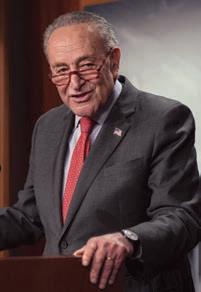
Recreational marijuana rollout set to drum up $1.3B, create up to 24,000 jobs
New York’s recreational marijuana market is (almost) here, and the state has Tremaine Wright to thank for it.
Wright chairs the state Cannabis Control Board, the agency created to regulate the cultivation and sale of recreational cannabis. The former attorney and assemblywoman was tapped to lead the program shortly after former Gov. Andrew Cuomo signed the Marijuana Regulation and Taxation Act in March 2021.
The law proposed an 18-month timeline to roll out recreational marijuana sales by the end of 2022, which Wright described at a Crain’s event last year as “reasonable although aggressive.” Although the state may fall short of meeting that self-imposed deadline, implementation is well underway.
Officials recently took two huge steps forward in the process: approving the first retailers and selecting the construction and architecture firms that will build the stores. They also signed the first property lease on Dec. 7 for a dispensary near the Apollo Theater in Harlem.
The 10 teams of construction and architecture firms will develop about 150 recreational marijuana dispensary locations across New York. The state will lease these spaces from private landlords, then sublease them to the dispensary owners. Officials are still working to find sites and expect that process to last through 2023.
As chair of the cannabis control agency, Wright is focused on how to use the industry to promote equity and inclusion across communities and allow New Yorkers who were disadvantaged by the state’s former legal restrictions on drug use to capitalize on marijuana’s legalization. In November the Cannabis Control Board granted the first 28 individual licenses to experienced business owners who’d had encounters with the justice system. Half of all licenses are set aside for social-equity applicants.

The state has also committed to preserving 50% of the licenses for small and minority-owned businesses. Wright said she is working to close the access-to-capital gap to ensure that small businesses can compete in the market.
The mayor’s office estimated that sales of adult-use cannabis in the city will reach $1.3 billion in 2023 and will help create between 19,000 and 24,000 jobs in the five boroughs in the next three years.
16 | CRAIN’S NEW YORK BUSINESS | DECEmBER 19, 2022 NEWSMAKERS 2022
BUCK ENNIS
BLOOMBERG
■
BLOOMBERG
STEPHEN ROSS, CEO of The Related Cos.
CHUCK SCHUMER, U.S. Senate majority leader
TREMAINE WRIGHT, state Cannabis Control Board chairman
IN ITS INAUGURAL LIST of notable Asian leaders, Crain’s recognizes changemakers who are spearheading innovation and making our city a better place.
Asians are considered the fastest-growing demographic in the nation, and New York is home to 1.5 million people of Asian descent. Crain’s sought to spotlight members of this group who have demonstrated the ability to power change in their industry or their broader communities. In particular, Crain’s looked for leadership in diversity and inclusion and philanthropic or mentoring activities.
e 50 professionals who made the list hail from a wide array of industries and backgrounds. Peruse the honorees and nd individuals who have grown to be titans of their industries: leading law rms, reimagining real estate and driving investment decisions in the nancial capital of the world.
You’ll also nd individuals working on social problems like homelessness, providing culturally competent health care to diverse communities and putting representation center-stage in fashion, to name just a few of the ways this group strives to uplevel the quality of life in the city.
Candidates were required to live in the greater New York area, be of Asian descent and have been employed for at least a decade. Read on to meet this impressive group.

 RINKU BHATTACHARYA
RINKU BHATTACHARYA
Rinku Bhattacharya oversees nance, business strategy and information technology as CFO for Lutheran Social Services, a nonpro t that provides vulnerable New Yorkers with services that assist them with their mental-health, special-education and housing needs. Bhattacharya and the team she supervises handle audits, budgets, compliance and systems infrastructure for the organization. Notably, she restructured its accounting function to better manage growth and ensure timely and compliant reporting. Bhattacharya is on the boards of several nonpro ts that focus on underprivileged youth in the New York area, including the Boys and Girls Club of New Rochelle, City Living NY and Hudson Valley Youth Robotics.
 RAY CHAO
RAY CHAO

At Vox, Ray Chaos oversees growth strategy across podcasts and digital video. Since joining the company, the senior vice president and general manager of audio and digital video has overseen a string of new partnerships and acquisitions that jump-started the network’s growth and helped double its monthly downloads in one year. Chao has led sales and distribution partnerships with several acclaimed shows. He is a member of Vox’s DEI+ Accountability Group, where he helps develop and execute diversity, equity and inclusion strategies. Chao has helped cultivate a diverse roster of talent at the Vox Media Podcast Network, bringing in employees from an array of cultural backgrounds.
CHAUDRY




At professional services rm KPMG, audit partner Asad Chaudry deals primarily with large corporate clients with diverse international businesses. Chaudry is a “people management” leader in the New York audit practice and a rm-designated Securities and Exchange Commission reviewing partner, serving as a qualitycontrol reviewer on public entities. He is responsible for assisting teams in identifying best practices, industry trends and insights to enhance audit quality and the overall client experience. Chaudry is on the board of directors at the Manhattan eatre Club, which aims to support and produce innovative works by American and international playwrights.
 CLIFF CHOW
CLIFF CHOW
Cli Chow oversees Americon HITT’s city-based team and provides executive oversight and management for the construction rm’s operations in New York, New Jersey and Connecticut. Chow has guided the rm through the economic trials of the Covid-19 pandemic, establishing protocols that enabled teams to work safely while ensuring continued payments for subcontractors. e senior vice president and regional o ce leader heads Americon HITT’s corporate social responsibility and volunteerism e orts, which include regular support for St. Francis Food Pantries and Shelters through food drives and donations. In addition, Chou leads building projects to support Red Hook Farms, an urban farming and food justice program in Brooklyn.
REGINA FOJAS
e Times Square Alliance is a nonpro t that works to improve and promote the bustling district. Regina Fojas, its chief of sta , is responsible for outreach and engagement strategy for its approximately 7,500 stakeholders, including property owners, commercial tenants and residential tenants. Fojas executes the nonpro t’s advocacy agenda and communicates with its board of directors. She initiated the alliance’s participation in the City Cleanup Corps and Clean Curbs pilot programs. Fojas was part of the 2021 cohort of nonpro t Coro New York’s Neighborhood Leadership Program. She volunteers at Encore Community Services, where she packs meals for the elderly.
DECEMBER 19, 2022 | CRAIN’S NEW YORK BUSINESS | 17
Senior vice president, chief of staff | Times Square Alliance
Senior vice president, regional of ce leader | Americon HITT
ASAD
Audit partner | KPMG
Senior vice president, general manager, audio and digital video | Vox Media
Chief nancial of cer | Lutheran Social Services of New York
LILY GUO
Founder, president American Regional Center For Entrepreneurs
Lily Guo’s responsibilities at the American Regional Center for Entrepreneurs run deep. The federally designated EB-5 center connects foreign investors with developers in need of funding,
granting them eligibility to apply for a green card. The founder and president’s responsibilities include identifying real estate development projects in the New York region suitable for financing. Guo is in charge of tracking and managing the use of those funds. She is on the board of the Chinese Business Association of New York and part of a team of lawyers who provide pro bono services to immigrants facing financial and social hardships. Guo is on the board of Invest in the USA, a nonprofit industry trade association.
CHRISTINA HO Vice president Consolidated Edison



At energy services giant Con Ed, Christina Ho leads a team of 500 in serving district steam customers across Manhattan. The vice president of steam operations is responsible for operational and management leadership related to energy production facilities, transmission and distribution, marketing and sales, customer relationships, and strategic planning. Ho is co-executive sponsor of an LGBTQ employee resource group and is an active member of the Asian Employee Alliance of Con Edison. She is a long-standing board member of the Museum of Chinese in America. She also is on the board of the International District Energy Association.
BRIAN HSU Partner Goldstein Hall
At full-service real estate law firm Goldstein Hall, partner Brian Hsu concentrates his practice on affordable housing development, banking, cooperative and condominium law, and real estate finance.
Hsu represents for-profit and nonprofit developers alike in a wide range of real estate matters including acquisitions and dispositions, construction, financing, leasing and management. Hsu recently was honored by Habitat for Humanity New York City and Westchester for his contributions to the organization. He leads Goldstein Hall’s Black, Indigenous and People of Color Developer Program. He serves on the board of directors of the Habitat for Humanity NYC Fund, which helps support low- and moderate-income people.
DARWIN HUANG Partner

Kasowitz Benson Torres
Darwin Huang of law firm Kasowitz Benson Torres advises developers, investors, financial institutions, insurance companies and asset management companies, among others. Huang, a partner in the real estate transactions group and a member of the firm’s business development committee, has significantly increased the number of Kasowitz’s Asian clientele. As a member of the firm’s Asian affinity group, he leads initiatives that support the development and retention of Asian attorneys at Kasowitz. Huang is the lead partner in sponsoring and supporting Apex for Youth, a New York–based charity empowering underserved Asian and immigrant young people in the city.
FRED HUANG
Managing director Forest Hills Financial Group

At Forest Hills Financial Group, Fred Huang plays a vital role in recruiting and developing the firm’s innovative team of professionals. The managing director conducts workshops and seminars and creates in-language financial literacy materials to help his clientele understand diverse financial programs and plans.
Huang partners with other Asian American professional communities—including accountants, law firms, banks, real estate professionals and health care providers—to deliver valuable trust-based services.
He is a national board member of the Asian American Insurance and Financial Professional Association and president of the organization’s Northeast chapter.
IN THE COUNTRY. FROM 2010 TO 2019, THE AAPI POPULATION GREW BY 25.5%, AND THE DEMOGRAPHIC ACCOUNTS FOR ABOUT ONE-FIFTH OF ALL U.S. POPULATION GROWTH
—NEW AMERICAN ECONOMY RESEARCH FUND
MONICA ISSAR
Managing director
JPMorgan Private Bank
Monica Issar is responsible for the portfolio management, due diligence and sustainable investing teams at JPMogran Private Bank. Together, the three teams consist of 240 employees who cumulatively oversee more than $600 billion in assets. As managing director and global head of multi-asset and portfolio solutions, Issar and her teams serve clients from offices in New York, Miami, Los Angeles, London and Madrid. She has mentored fellow Asian professionals throughout her two-decade career. She is a member of the women of color advisory board, which focuses on the retention and development of women of all ethnic backgrounds.
ARCHANA IYER Partner

Fragomen, Del Rey, Bernsen & Loewy
At law firm Fragomen, Del Rey, Bernsen & Loewy, partner Archana Iyer handles immigration issues for major players in the tech industry, including the software engineering sector. Iyer also represents consumer products and pharmaceutical companies, streaming services, financial services firms and logistics providers, servicing a clientele of sophisticated multinational enterprises. Even as the Covid19 pandemic shuttered U.S. consulates and made the work of immigration attorneys more difficult, Iyer presided over significant growth for her Fragomen team. She mentors fellow Asian American attorneys, and she has volunteered for the Legal Aid Society. Iyer has helped thousands of South Asian immigrants come to the U.S.

DR.
PRITI
Founder, CEO Nao Medical
JAIN
RICHARD KIM Shareholder, co-chair Greenberg Traurig



Dr. Priti Jain’s responsibilities at Nao Medical, a provider of urgent and primary care, include overseeing its operations in the five boroughs and on Long Island as well as its fleet of mobile care sites. Under the leadership of Jain, its founder and CEO, Nao remained open during the pandemic and provided 700,000 New Yorkers with access to PCR tests, rapid tests and antibody infusions. The organization recently opened three locations, expanded its range of services to include mental health, and simplified the patient registration process through a contactless appointment system.
As co-chair of the global finance practice and of the New York corporate practice at law firm Greenberg Traurig, Richard Kim leads debt financing transactions for major privateequity funds in the U.S. and abroad. He negotiates debt commitment letters and hammers out credit agreements while advising clients on the latest terms in the leveraged finance market. Kim, a member of Greenberg Traurig’s Asian affinity group, leads the firm’s summer associate program, through which he mentors Asian American law students. He also participates in mentoring programs organized by the Korean American Lawyers Association of Greater New York and the National Asian Pacific American Bar Association.
JEE MEE KIM-DIAZ City executive Arcadis
Jee Mee Kim-Diaz brings 20 years of experience in managing complex urban development and transportation projects to her role as city executive at Arcadis, a sustainable design and engineering consulting firm. Before joining the company, Kim-Diaz was appointed by Mayor Bill de Blasio to be chief strategy officer for the city Department of Transportation, a position in which she oversaw the policy, intergovernmental affairs, press, communications and safety education teams. During her tenure at the Transportation Department, Kim-Diaz advanced the administration’s 2021 transportation commitments and developed a plan to upgrade the Brooklyn-Queens Expressway triple cantilever. She has been a board member at the Rockaway Initiative for Sustainability and Equity, where she advanced youth engagement and development programs focused on Black and Latino students.
18 | CRAIN’S NEW YORK BUSINESS | DECEmBER 19, 2022
ASIAN AMERICANS AND PACIFIC ISLANDERS REPRESENT THE FASTEST-GROWING MINORITY GROUP
NISHAT KURWA Senior vice president, executive producer, audio Vox Media
Nishat Kurwa oversees programming strategy, new show development and production at the Vox Podcast Network. The senior vice president and executive producer of audio, who has helped build franchises

around critically acclaimed podcasts such as Land of the Giants, was named to The Hollywood Reporter’s inaugural list of podcast power players. Kurwa has helped steer the network creatively by developing and serving as executive producer of new seasons for existing franchises. She is a member of the company’s Asian American Pacific Islander employee resource group and, mindful of the need for diversity, equity and inclusion, its DEI+ Accountability Group. Kurwa is a mentor for Spotify’s Sound Up program, which supports women of color in audio. She is a lifetime member of the South Asian Journalists Association.
JOANNE KWONG President Pearl River Mart

At Pearl River Mart, a city icon and the world’s first Chinese American department store, Joanne Kwong has modernized the business for a new generation. With her in-laws, the company president built four stores in as many years, expanding the organization’s reach, offerings and community activities. Kwong also leads the business’s marketing, development and community collaboration. She served on the Small Business Sector Advisory Council and on the local planning committee of the state’s Chinatown Downtown Revitalization Initiative. Among her honors, Kwong was named by Gold House, a nonprofit collective of Asian and Pacific Islander founders, to its A100 list of the most impactful Asian Americans.
EDWARD LAI
Senior vice president of business development Bensonhurst Center for Rehabilitation & Healthcare, Fairview Nursing Care Center
Edward Lai is the chief marketer and a health care executive working for the Bensonhurst Center for Rehabilitation & Healthcare, the Fairview Nursing Care Center and the Brooklyn Queens Nursing Home. As senior vice president of business development, Lai works to build sustainable working relationships with hospitals and community partners. During the pandemic, he incorporated a concierge approach to care at the facilities. During his career, Lai has been responsible for establishing Asian subacute programs in New York and several other home-care programs with services tailored for Asian populations. Lai is involved with the Chinese American Planning Council and several other community organizations.
VIRGINIA LAM ABRAMS Executive vice president Starr y Group Holdings

At Starry Group Holdings, a fixed wireless technology developer and internet service provider, Virginia Lam Abrams is executive vice president of communications, government affairs and strategic advancement. Lam Abrams is responsible for guiding and managing all external communications including media relations. She has helped guide Starry through major milestones such as taking the company public in March, growing its digital-equity program to reach more than 87,000 units of public and affordable housing, and helping to expand the company’s footprint in six major metropolitan areas. Lam Abrams is executive sponsor of Starry’s employee resource group for women.
DON LEE
Chair, board of directors Homecrest Community Services
Don Lee helps the nonprofit Homecrest Community Services fulfill its mission of providing community-based social services for immigrant senior citizens and families in southern Brooklyn. Lee’s responsibilities as board chair include

soliciting public and private sources to raise funds for the nonprofit’s Bensonhurst Community Center. In addition, he collaborates with HCS’ executive director on programming and service delivery. During the pandemic, Lee created “stir-fry meals on wheels,” partnering with local restaurants to feed elderly people in need. He is a senior adviser to the Alliance for Community Preservation and Betterment, and he counsels the Chinatown community.

December 19, 2022 | crAIN’S NeW YOrK bUSINeSS | 19
Crains_NY_CP_Half_Hor_12-05-22.indd 3 12/05/2022 10:46:41 AM
JULIUS LEE
Vice president, platform distribution operations
The Walt Disney Co.
Julius Lee manages a 19-member team at Disney that provides technical and operational expertise. The vice president of platform distribution operations also leads engagement with third-party distribution partners, sits on the Disney Platform Distribution Diversity, Equity and Inclusion Council and spearheads accountability initiatives. In 2020 Lee was honored as one of the “most influential multiethnic executives” by Cablefax, and he received the Cable Television Administration and Marketing Society’s TAMI Award, which honors individuals for their contributions to initiatives that drive the success of the TV industry. Lee is a member of CTAM and the National Association for Multi-ethnicity in Communications.
MELODY LEE
Senior vice president, global brand and product marketing Herman Miller and Knoll
Melody Lee leads global brand and product marketing for the two largest marquee brands— Herman Miller and Knoll— within the MillerKnoll collective. The senior vice president is responsible for the positioning and marketing strategy for those brands across all channels and touch points as well as for their global product launches. As a board member and chair of the strategy and marketing committee at Apex for Youth, an Asian American youth development organization, Lee leads long-term strategic planning to prepare the nonprofit for its next phase of growth. She is board adviser to New York Women in Communications and to Le Car, a personalized car-shopping platform she co-founded.
MYUNG LEE President, CEO Volunteers of America
At Volunteers of America–Greater New York, Myung Lee oversees all aspects of organizational strategy, operations, programs and external affairs. The 126-year-old human services organization aims to end homelessness in the region through housing, health and wealth-building services. The organization’s president and CEO oversees all aspects of organizational strategy, operations, programs and external affairs. Lee supervised the opening of East Clarke Place, an affordable residence for low-income senior citizens or those who have been chronically homeless. She was instrumental in doubling the capacity of the Jamaica Women’s Employment Shelter. She is implementing a pilot program designed to inform how first responders work with domestic violence survivors.
SUSAN LEE
Founder, president Alliance for Community Preservation and Betterment
Susan Lee says she founded the Alliance for Community Preservation and Betterment to improve the quality of life, public safety and neighborhood conditions in and around Manhattan’s Chinatown.
As an example of her work, Lee successfully mobilized residents, business owners and young people to oppose a proposed safe injection and homeless shelter site less than 1,000 feet from several day care centers and schools. Lee, the group’s president, continues to plan neighborhood events grounded in civic and community engagement. Voter registration and park cleanup initiatives are among those events. Under her leadership, ACPB applied for and received funding to upgrade the safety and usability of a section of Chinatown for seniors and children.
TJ LIM Managing director, head of client digital

JPMorgan Private Bank
As managing director and head of client digital at JPMorgan Private Bank, TJ Lim is responsible for managing priorities related to the bank’s digital platforms and the experiences of the clients and advisers who use them. In addition to leading the product managers who build the platforms, Lim is a key member of several diversity, equity and inclusion initiatives at the organization. He is a leader in the Asian Leadership Forum and was interim co-chair of an LGBTQ network. Lim has received several industry awards. He is the bank’s representative on the Asia Society Technology and Innovation Council.
TERESA LIN
Vice president of cultural market development
VNS Health
At VNS Health, Teresa Lin oversees community centers in Chinatown, Flushing and Sunset Park, Brooklyn. In the past 18 months, the vice president of cultural market development has led the growth of VNS Health’s programs in the city’s Asian American communities. During that time, she oversaw the opening of two community centers. Motivated to combat anti-Asian sentiment and health disparities during the pandemic, Lin and her colleagues secured more than 50,000 items of personal protective equipment for distribution in the Asian community. She is on the CaringKind Chinese advisory board and the New York–
Presbyterian Lower Manhattan community advisory board.
GILBERT LIU
Partner and chair, securitization
Kramer Levin Naftalis & Frankel
Gilbert Liu of law firm Kramer Levin Naftalis & Frankel helped spearhead an important advancement in the fight to address climate change by acting as deal counsel for the first securitization of commercial and industrial solar assets.
Liu, a partner and chair of the securitization finance practice, has helped pioneer numerous first-of-their-kind transactions in the securitization of complex assets. He is co-chair of the firm’s collaboration and technology committees. Liu, who is on the management committee, is responsible for the firm’s business development strategy and lateral partner hiring. He is on the Apex for Youth board of directors and executive committee.


SHEILA LIRIO MARCELO
CEO, co-founder Proof of Learn
Chief Executive Sheila Lirio Marcelo leads Proof of Learn, a Web3 platform that aims to provide accessible, quality education worldwide. Previously, Marcelo founded care .com, which today is the largest online destination for finding and managing family care. She was care.com’s chairwoman and CEO until 2020. Marcelo has received numerous accolades, including being named as one of Fortune’s Top 10 female entrepreneurs. She is a Henry Crown Fellow at the Aspen Institute, a young global leader of the World Economic Forum, a Marshall Memorial Fellowship awardee and a member of the Council on Foreign Relations.
TARIQ MUNDIYA
Partner, chair of the litigation department Willkie Farr & Gallagher
As a partner at law firm Willkie Farr & Gallagher, Tariq Mundiya leads a 250-lawyer litigation department. Mundiya has led the group through significant growth in recent years, including the addition and expansion of litigation teams in Chicago, San Francisco and Los Angeles. As a member of the firm’s executive committee, Mundiya guides public companies and investment funds in battles for corporate control. He supports the firm’s Asian Americans and Pacific Islanders affinity group. He previously was on the board of directors at Mobilization for Justice, an organization that advises and represents people who cannot afford legal counsel.

BETTY NG CEO, founder Inspiring Diversity

At Inspiring Diversity, a minority- and women-owned business enterprise, Betty Ng leads a group that develops and implements solutions meant to help organizations, educators and families foster cultures of diversity and inclusion.




Fueled by two decades of experience working with American Express, Citigroup and other companies, the CEO manages her team with respect to product and service development, content creation, business development and client engagement. Ng, who co-authored—with her mother—the book Po-Ling Power: Propelling Yourself and Others to Success, co-founded the Asian American Authors Book Club. She is a member of the operating committee at Ascend Leadership’s Asian Executive Network.

20 | CRAIN’S NEW YORK BUSINESS | DECEmBER 19, 2022
THE CITY HAS 1.5 MILLION ASIAN RESIDENTS —ABOUT 17.3% OF THE POPULATION
—ASIAN AMERICAN FEDERATION
CARIN PAI
Executive vice president, head of portfolio management
Fiduciary Trust International


Fiduciary Trust International’s Carin Pai leads the wealth management company’s investment processes and equity strategy and provides guidance and support to its team of advisers. The executive vice president and head of portfolio management often collaborates with colleagues on issues relating to investment leadership, fixed income, alternative investments and research teams. In addition, Pai mentors women and minorities in her industry, and she leads the company’s Net Zero Asset Managers Initiative in exploring ways to help achieve net zero emissions by 2050. Pai is on the board of trustees at the Citizens Budget Commission, a nonprofit dedicated to seeking constructive change in New York’s finances and services.
PIERRE PHAM
ANGELA PINSKY
ABID QURESHI
AKILA RAMAN
Chief
experience
officer NYC Health + Hospitals/Elmhurst
At NYC Health + Hospitals/ Elmhurst, Pierre Pham is charged with fostering a culture of person-centered care and service excellence. The chief experience officer’s efforts include overseeing the hospital’s work to achieve




Person-Centered Care Certification from the nonprofit Planetree International and launching the Caring Connections program, which virtually brought families to their hospitalized loved ones during the pandemic. He established the Patient Family Advisory Council, which suggests improvements in processes and protocols meant to help patients and families navigate hospital services. Pham has volunteered for the nonprofit Help the Hungry.
Head of government affairs and public policy, Google New York Google

Angela Pinsky oversees all of Google’s government partnerships and legislative issues in New York, New Jersey and Connecticut. The head of government affairs and public policy is responsible for driving Google’s public-private partnerships and for working on priority initiatives such as the Tech Opportunity Fund, which increases access to computer science and technology education. Pinsky helps lead Google’s community and philanthropic efforts for the New York office. Notably, she led the installation of Google Nest security cameras for 500 Asian Americans and Pacific Islanders who are small-business owners. Pinsky is co-chair of the New York Building Congress’ government affairs committee.
Partner in charge of the New York office
Akin Gump Strauss Hauer & Feld
Abid Qureshi of Akin Gump Strauss Hauer & Feld is a critical component of the law firm’s financial restructuring practice. The partner in charge of the New York office, he specializes in high-stakes and highprofile reorganization and directs the office’s growth. Qureshi had led teams in the reorganization of Aeroméxico and Intelsat, among others. He is president of the U.N. Association of New York, a nonprofit educational organization that supports the principles and work of the United Nations, and he is a board member of Freedom United, a nonprofit dedicated to eradicating human trafficking and modern-day slavery.
Chief operating officer, investment banking division Goldman Sachs
Akila Raman drives Goldman Sachs’ business operations, working closely with global heads across all industries in the investment banking division to develop strategy. The division’s COO has invested in technology builds that automated repetitive charting and pitch book creations, and she has implemented dozens of initiatives to enhance the junior banker experience. One example: She recently focused on creating more in-depth training, reinforcing the apprenticeship model that the firm and its younger employees rely on. Raman, who is active in the Goldman Sachs Asian Professionals Network, is on the City Center board of directors.
December 19, 2022 | crAIN’S NeW YOrK bUSINeSS | 21
Congratulations to TJ Lim on being named to the Crain’s New York Business 2022 list of Notable Asian Leaders Not a commitment to lend. All extensions of credit are subject to credit approval. Bank deposit accounts, such as checking, savings and bank lending, may be subject to approval. Deposit products and related services are offered by JPMorgan Chase Bank, N.A. Member FDIC.
Morgan Private Bank” is a brand name for private banking business conducted by JPMorgan Chase & Co. and its subsidaries wordwide. JPMorgan Chase Bank, N.A. and its affiliates (collectively “JPMCB”) offer investment products, which may include bank-managed investment accounts and custody, as part of its trust and fiduciary services. Other investment products and services, such as brokerage and advisory accounts, are offered through J.P. Morgan Securities LLC (“JPMS”), a member of FINRA and SIPC. JPMCB, JPMS and CIA are affiliated companies under the common control of JPMorgan Chase & Co. © 2022 JPMorgan Chase & Co. All rights reserved. INVESTMENT PRODUCTS: • NOT FDIC INSURED • NO BANK GUARANTEE • MAY LOSE VALUE 47595a_CH-PB-ADS-PROD-1122-PB-1330294-TJ Lim Crain's Notable Asian Leader Ad-V04.indd 1 30/11/22 10:40
“J.P.
THERESE RODRIGUEZ
CEO Apicha Community Health Center
At the Apicha Community Health Center, which specializes in care for the LGBTQ community and people living with HIV/AIDS, Therese Rodriguez oversees the development, implementation and maintenance of programs, facilities and staff. The CEO was involved in the creation of health clinics for Apicha meant to serve Asian Americans and Pacific Islanders, in part by developing programs that addressed linguistic and cultural barriers. Rodriguez was appointed by Gov. Andrew Cuomo to a task force that aimed to end the AIDS epidemic and by Mayor Bill de Blasio to the Public Health and Healthcare Sector Advisory Council. She is on the board of the National Minority AIDS Council.
TEJASH SANCHALA
director
Executive
Westchester County Human Rights Commission
Since 2019, when Westchester County Executive George Latimer appointed him executive director of the county Human Rights Commission, Tejash Sanchala and his team have worked to combat discrimination and hate. It is a job that entails investigating and adjudicating discrimination complaints in an area that is home or host to more than a million residents and visitors.

When the Covid-19 pandemic hit, Sanchala found himself appearing often at news conferences and community events and on panels to speak about the perils of hate crimes against Asian Americans and the ways to combat such malice. He has developed solidaritybuilding workshops in partnership with African American Men of Westchester and other organizations.
GENNIE SANCHEZ Senior vice president of Supply Chain Maimonides Medical Center


Gennie Sanchez is responsible for supply-chain emergency preparedness and pandemic response at Maimonides Medical Center, as well as clinical value assessments, and leadership accountability for achieving budgetary and service targets.


In addition to saving $5.5 million in annual supply-chain funding through close collaboration with clinical personnel, the senior vice president has led an initiative at Maimonides with Brooklyn Communities Collaborative to increase procurement from local minority- and woman-owned business enterprises to 10% by 2030. Sanchez is the founder, leader and executive sponsor of Maimonides’ Asian Employee Resource Community, which provides the health system’s Asian staff with support and learning opportunities.
CHARAN SANDHU Partner
 Weil, Gotshal & Manges
Weil, Gotshal & Manges
Charan Sandhu helps lead Weil, Gotshal & Manges’ 30-member technology and intellectual property transaction practice. The law firm partner, a noted strategic adviser, regularly counsels on the technology and IP aspects of major mergerand-acquisition transactions.
Sandhu has worked on deals totaling more than $100 billion in the past 18 months. At the firm, she helps lead a 140-lawyer affinity group, AsianAttorneys@ Weil, and she has been instrumental in developing its professional programs for minority attorneys. Sandhu is on the board of governors for the South Asian Bar Association and on the legal advisory council for the Sikh Coalition, a civil rights organization.
JENNIFER SCHWARZ Senior vice president of engineering services
The Walt Disney Co.
Jennifer Schwarz leads the engineering services team under the Disney Media and Entertainment Distribution technology group. The senior vice president of engineering services is responsible for quality assurance, code and release management and performance monitoring. Schwarz developed and implemented resilient infrastructure platforms for use by every part of the company. In addition to championing women in technology, she has built a world-class team of engineers who focus on product and business alignment.
Schwarz has inspired programs, such as Code: Rosie, which helps women in the technology community at Disney learn new skills.
22 | CRAIN’S NEW YORK BUSINESS | DECEmBER 19, 2022
Congratulations Gilbert Liu We are proud to congratulate our partner Gilbert Liu on being named a Crain’s New York Business 2022 Notable Asian Leader.
PETER SHU-YEN WANG
Principal, design director Gensler

Peter Shu-Yen Wang is a trusted adviser to his clients at Gensler, an integrated architecture, design, planning and consulting firm. The design director and principal helps them create solutions that align with their business goals. In addition to helping build Gensler’s New York residential practice, Shu-Yen Wang provides principal oversight for the Justice, Equity and Design Dialogue series for the company’s Northeast region. His projects have won numerous awards including ones from Interior Design and the Society of American Registered Architects. Shu-Yen Wang is a mentor in Columbia University’s Odyssey Mentoring Program. He volunteers with Schools That Can, among other nonprofits.
HING LIN “HELEN” SIT Chinatown NNORC LCSW, manager VNS Health
Hing Lin “Helen” Sit manages VNS Health’s Chinatown Neighborhood Naturally Occurring Retirement Community, which helps residents 60 and older living in and around Lower Manhattan to age safely at home. At the nonprofit, Sit oversees a team of social workers, nurses, volunteers and other caregivers that provide life-changing services to those in need. The licensed clinical social worker strives to develop and maintain relationships with dozens of community partners, including hospitals and government agencies, and to provide referrals to NNORC members. Sit has led a collaboration with the Chinese American Nurses Association in a grant-funded project that provided older adults with resources that helped them manage their blood pressure.
 BIPIN SUBEDI
BIPIN SUBEDI
Chief medical officer
NYC Health + Hospitals/Correctional Health Services
Bipin Subedi oversees medical, mental health and pharmacy services at NYC Health + Hospitals/ Correctional Health Services. As chief medical officer of the direct health care provider for many local jails, Subedi is charged with ensuring quality treatment for the detained as he manages the delivery, integration and coordination of health care services. Subedi helped lead efforts to develop systemwide interventions to ease the adverse mental health effects of the Covid-19 pandemic on incarcerated individuals. In addition, he oversaw initiatives to improve initial access times to mental health care for patients entering the system. Subedi, a member of the American Psychiatric Association, has researched and lectured on correctional mental health, trial competency and racial bias.
RAKSHA TRIPATHI
Chief financial officer
NYC Health + Hospitals/Gotham Health
Raksha Tripathi oversees financial functions for NYC Health + Hospitals/Gotham Health’s federally qualified health centers, including budgeting, billing and collection; managed care; registration; and grant awards.


The CFO leads the financial strategy planning process, including submitting reports and making presentations to the Gotham Health board. Her recent accomplishments include leading a department that has processed more than a million visits, collected $265 million in revenue, provided medical coding training at all sites and credentialed providers with all major city insurance plans.
Tripathi is working with clinical teams to generate baselines to inform value-based reimbursements.

VERONICA TSANG
Executive vice president, chief retail administrator
Cathay Bank
Before joining Cathay in 2005, Veronica Tsang was a vice president at JPMorgan Chase. Tsang was manager of the Chase headquarters branch and the Chinatown market, and she was responsible for the Bank-atWork customer support group. Throughout her career, Cathay’s executive vice president and chief retail administrator has worked to promote Asians in the workplace by mentoring and by initiating local programs designed to educate the Asian community about the world of financial products. Tsang co-founded the Chinese Gift of Life program, which provides free open-heart surgery in the U.S. to Chinese children with congenital heart disease.


December 19, 2022 | crAIN’S NeW YOrK bUSINeSS | 23
MEATPACKING-DISTRICT.COM @MEATPACKINGNY CONGRATULATIONS
Thank you for your dedication to New York City and outstaning leadership in New York’s Business Community.
JOANNE
KWONG AND ANGELA PINSKY
JOANNE KWONG, PEARL RIVER MART MEATPACKING BID BOARD MEMBER
SN9_MTPK_NOV22_CRAINS AD_120822.indd 1 12/8/22 9:20 AM d
ANGELA PINSKY, GOOGLE MEATPACKING BID BOARD MEMBER
SIMON WONG Executive vice president Sabio
Simon Wong is responsible for leading product innovation, partnerships, inventory and global growth efforts at Sabio, a connected television platform. Since joining the company in 2016 as director of advertising operations, Wong has been instrumental in developing product strategy and fostering growth. This year NYC Television Week named the executive vice president to its 40 Under 40 list, which recognizes the industry’s next generation of boundarypushing pioneers. Wong is a mentor in the Asians in Advertising program, which seeks to create job opportunities for participants and groom them for leadership positions.
ADELINA WONG ETTELSON
Global head of residences marketing Mandarin Oriental Hotel Group

Adelina Wong Ettelson delivers revenue-generating marketing programs for the Mandarin Oriental Hotel Group, an owner and operator of hotels, resorts and residences worldwide.
As global head of residences marketing, Wong Ettelson leverages her expertise in luxury hospitality and real estate marketing. She delivers revenuegenerating marketing programs for the organization and provides brand direction to developers in established and emerging luxury real estate markets including in New York.


Wong Ettelson is a board member of Save Venice, a nonprofit dedicated to the artistic heritage of the city, and she is an adviser to the nonprofit Leading Asian Americans to Unite for Change.
ASHLEY WU Senior manager Deloitte


Deloitte’s Ashley Wu has more than a decade of experience battling money laundering. At the professional services giant, Wu is responsible for overseeing and managing client engagements, from the pursuit process through completion. In addition to facilitating training programs and mentoring fellow professionals, the senior manager has raised funds on behalf of Send Chinatown Love, a group that supports struggling merchants, and Stop AAPI Hate. Wu has volunteered with Citymeals on Wheels for more than four years. She is an active member of Apex For Youth and iMentor.
SOPHIA YEN
Senior principal, insurance strategy and innovation leader



EY
Sophia Yen’s more than two decades of experience helps her meet the challenges of being senior principal and EY Americas insurance strategy and innovation leader. Yen drives growth through target operating models, strategic ventures, market insights, innovation and emerging technologies for the professional services behemoth. She is on the EY Americas and EY Global Insurance Leadership teams. As the EY insurance board leader, she is tasked with leading quarterly board director forums.
Yen is a mentor in Ascend, a pan-Asian business professional membership organization. She is on the board of governors for the Insurance Industry Charitable Foundation.


WEN ZHOU
CEO, co-founder 3.1 Phillip Lim
Wen Zhou, who is responsible for almost every aspect of 3.1 Phillip Lim’s operation, is one of the few Asian American women at the helm of a major fashion label. The CEO and co-founder frequently works with Asian American models. She also strives to amplify Asian culture in other ways, such as by co-chairing the Taste of Asia festival. Zhou recently designed alternate uniforms for the Brooklyn Nets to celebrate the Lunar New Year. She has partnered with Panda Express in an effort to combat food insecurity. As an Apex for Youth board member, she has chaired the Asian empowerment organization’s gala three years running.
24 | CRAIN’S NEW YORK BUSINESS | DECEmBER 19, 2022
Raksha Tripathi’s leadership, expertise, and dedication to the Asian American community has enabled Gotham Health to provide high quality, affordable healthcare to all New Yorkers. NYC Health + Hospitals/Gotham Health Leadership Celebrates RAKSHA TRIPATHI Gotham Health, CFO CRAIN’S NEW YORK BUSINESS NOTABLE ASIAN LEADERS 2022 @NYCGothamHealth
sembly district encompassing Flushing in Queens. Zeldin capitalized on a number of trends: rising crime, concerns over the future of city public schools and anger over little-known state legislation that caused an uproar in the Chinese community.

Skurnik estimates that as much as 14% of the 5.1 million-person city electorate is now East and South Asian, including voters from China, Korea, Bangladesh and India. e Chinese are the largest group of this cohort.
e sway of these voters appeared in races for the state Legislature.
Lester Chang, an underfunded Asian American Republican who didn’t even live in the district where he was running, defeated Peter Abbate, a Democratic assemblyman who has represented the Brooklyn neighborhoods of Sunset Park and Dyker Heights since 1987. (Democrats are now challenging Chang’s residency and may refuse to seat him in the Assembly.)
In a state Senate seat in the same area, where Asian American voters are a plurality, Iwen Chu, a Democratic former chief of sta to Abbate, barely eked out a victory. She overcame a white Republican rival by just 215 votes. e close result suggests that many Asian American voters appeared willing to buck racial identity altogether—Chu will be-
rails on that issue,” said John Liu, a Queens state senator. “We did not follow through. We enacted legislation and expected people to understand what the landmark reforms actually meant.”
Liu, the rst Asian American ever elected in New York when he won a City Council race in 2001, was referring to the 2019 criminal-justice reforms passed in Albany. ose reforms partially ended the use of cash bail. Conservatives and even some moderate Democrats have blamed the change in bail laws for the spike in crime in the ve boroughs. Hard evidence of such a correlation remains murky, however, especially because crime has risen in many urban and rural areas around the country since the start of the pandemic.
Also, the surge in anti-Asian hate crimes has left many neighborhoods on edge. e killing of Michelle Go and Christina Yuna Lee— Go was shoved on the train tracks by a mentally ill man, and Lee was followed back to her Chinatown apartment, where she was stabbed—crystallized for many Asian voters that public safety had to be their top priority.
e Chinese-language press extensively covers other anti-Asian crimes as well—assaults and robberies. News passes rapidly through WeChat, a popular Chinese messaging app. Law-and-order Republicans have the advantage; the progressive Democrats who called for defunding the city Police Department during the protests over the murder of George Floyd in 2020 are now on the defensive.
in Brooklyn, Queens and Manhattan until the race got close.
Specialized schools
SHSAT survived.
come the rst Asian American woman elected to the Senate—to choose the Republican candidate.
The bail reform factor
Why are Asian American voters in New York souring on the Democratic Party? Conversations with community members and politicians point to at least one overriding issue: crime.
“ e Republicans beat the shit out of us on the crime narrative. ey wrongly but successfully equated bail with jail. Democrats fell o the
Leading Democrats have tried to convey their credentials on crime ghting. Hochul, a relative centrist, has boosted funding to the state police and earlier this year forced legislative Democrats to add more bail-eligible offenses. Democrat Eric Adams, the new mayor, is a former police captain who has rejected the defund movement.
Zeldin’s message about high crime, however, found a receptive audience in the community leaders and crowds in Bensonhurst, Sunset Park, Chinatown and Flushing. Hochul’s rose garden strategy meant she appeared at fewer public events

Another major issue for Asian Americans is education. Many defend the standardized test, the Specialized High School Admissions Test, for certain specialized high schools in New York, and Gifted and Talented, the accelerated program for elementary schools. Testing regimens have been blamed for discriminating against Black and Latino students and racially polarizing schools, but Asian parents from working-class and immigrant backgrounds view them as crucial steppingstones to stronger colleges for their children—an eventual ladder to the middle class and the American dream.
Special high schools are now heavily Asian, especially Chinese. In 2018 former Mayor Bill de Blasio attempted to scrap the SHSAT, blaming the test—the single metric for entry—for the declining number of Black and Latino students at schools such as Stuyvesant, Brooklyn Tech and the Bronx High School of Science. e backlash among Asian parents was erce. Enormous protests broke out, de Blasio backed away from his plan—he needed assistance from the state Legislature, and he wasn’t getting it—and the
But for Asian parents, bitterness lingered. A new generation had its political awakening.
“ at whole education ght forced us to pay attention to politics,” said Yiatin Chu, a community activist and president of the Asian Wave Alliance, a new political club for Asian American voters.
VOTER POWER 14%
SHARE
215

“Most people didn’t know what the City Council was, what the state Assembly and Senate were; they learned about the [state] law governing specialized high schools, Hecht-Calandra. Understanding which part of the government has authority over these speci c things was new to me and new to Asian New Yorkers.”
IWEN CHU
re-election campaign against a Republican, said he had been warning Democrats for years that “Asians are more pissed o at the former mayor [de Blasio] than Donald Trump.”
“After the rise of crime and violence that we are seeing throughout Covid, it all just culminated in us, as voters, feeling we didn’t really have a place to call home in politics,” said Kim, who is Korean American. e veteran Democrat, who has worked closely with progressives and socialists in Albany, said the left has disappointed him on issues a ecting his constituents.
Republican candidates such as Zeldin and Curtis Sliwa have unequivocally defended SHSAT and other specialized programs popular with Asian parents. Sliwa unsuccessfully ran for mayor in 2021 against Adams, but he reportedly built a cult following in the Asian community.
Republicans also sided with more conservative Asian voters on questions of real estate law and demographics that have been overlooked in the mainstream press. e pandemic-era eviction moratorium, supported by many Democrats in Albany, was deeply unpopular with smaller Asian American landlords.
Chu, the Asian Wave president, said she and many of her friends decided not to vote for Hochul as early as 2021, when the governor signed a historic “disaggregation” bill, which directs state agencies to break down data for the demographic known as Asian American Paci c Islander into individual ethnic groups. e bill was supported by many activists and a number of Asian American lawmakers. It angered Chinese community organizations, however, who argued, to no avail, it could lead to city and state policies that discriminate against Chinese residents.
What the left can do
Ron Kim, a Democratic assemblyman from Flushing who won a tight
“I think there is a kind of racial hierarchy on the left,” Kim added. “ e Asian working- and middle-class population doesn’t really register on that hierarchy. … It is superfrustrating for a person like me, who, time after time, showed up for progressive causes.”
Kim, a supporter of bail reform, tougher tenant protections and many causes prized by the left, said Democrats must do more to engage with vulnerable Asian voters; he has drawn headlines for his work on behalf of home health aides, helping them to battle wage theft and 24hour workdays. Kim’s advocacy for the aides has pitted him against nonpro ts and labor unions popular with Democratic lawmakers.
Liu, the Queens state senator, said education as an issue will long outlast crime—and it’s where Democrats can again make inroads with Asian voters if they defend metrics such as tests, which parents view as objective. A world without the SHSAT, they say, will be one with far fewer students from Chinese and Korean households headed to elite high schools.
“It’s so counterintuitive for many Asian Americans, particularly newer immigrants, when you say, ‘OK, we’re going to introduce greater equity by eliminating objective exams,’ ” Liu said. “It’s so contradictory, it becomes o ensive and enraging to many Asian voters.
“On the education front,” Liu added, “we have to do far better.” ■

DECEMBER 19, 2022 | CRAIN’S NEW YORK BUSINESS | 25
VOTERS FROM PAGE 1 ALAMY
“THAT
WHOLE EDUCATION FIGHT FORCED US TO PAY ATTENTION TO POLITICS”
REPUBLICAN MESSAGING appealed directly to Asian American voters.
OF the city electorate that is East Asian or South Asian
, a Democrat, eked out a victory by 215 votes
ALAMY
ZELDIN campaigned in Bensonhurst and Flushing.
CLASSIFIEDS
REQUEST FOR PROPOSAL
Wildlife Conservation Society (WCS) Request for Proposal for Contract Management Services, Prospect Park Zoo, Baboon Night Quarters and Exhibit. Proposal Due Date: January 31, 2023 (Electronic submission to bids@wcs.org). PreProposal Conference Site Visit(In Person):Will now be held on December 14, 2022 at 10:00 A.M. E.T. and NOT on Dec. 13, 2022 as previously advertised. The project is being funded by the City of New York through its Department of Parks and Recreation and is subject to certain NYC requirements and WCS policies. For a copy of the RFP please email ahowell@wcs.org.
Notice of Formation of DARBY TOWNHOMES PRESERVATION GP, LLC
Arts. of Org. filed with Secy. of State of NY (SSNY) on 11/10/22.
Office location: NY County. Princ. office of LLC: 30 Hudson Yards, 72nd Fl., NY, NY 10001. SSNY designated as agent of LLC upon whom process against it may be served. SSNY shall mail process to Corporation Service Co., 80 State St., Albany, NY 12207.
Purpose: Any lawful activity.
Contact Suzanne Janik at 313-446-0455 or email: sjanik@crain.com
PUBLIC & LEGAL NOTICES
Notice of Formation of EVERGREEN STAFFING LLC
Arts. of Org. filed with Secy. of State of NY (SSNY) on 11/07/22.
Office location: NY County. SSNY designated as agent of LLC upon whom process against it may be served. SSNY shall mail process to c/o Farrell Fritz, P.C., 400 RXR Plaza, Uniondale, NY 11556.
Purpose: Any lawful activity.
NOTICE OF FORMATION OF Modern Home and Travel LLC
Notice of Formation of ONE GOD LLC Arts of Org filed with the Secy of State of NY (SSNY) on 11/1/22.
Office location: NY County. SSNY designated as agent of LLC upon whom process against it may be served. SSNY shall mail process to One God LLC p.o. box 660102 Fresh Meadows, NY 11366.
Purpose: For any lawful activity.
Articles of Organization filed with the Secretary of State of NY (SSNY) on 9/27/22. Office location: New York County. SSNY has been designated as agent upon whom process against it may be served. The Post office address to which the SSNY shall mail a copy of any process against the LLC served upon him/her is 14 Murray St #180, New York, NY 10007.
Purpose: For any lawful purpose
Notice of Formation of DARBY TOWNHOMES DEVELOPER, LLC
Arts. of Org. filed with Secy. of State of NY (SSNY) on 11/10/22.
Office location: NY County. Princ. office of LLC: 30 Hudson Yards, 72nd Fl., NY, NY 10001. SSNY designated as agent of LLC upon whom process against it may be served. SSNY shall mail process to Corporation Service Co., 80 State St., Albany, NY 12207.
Purpose: Any lawful activity.
Notice of Formation of Limited Liability Company (LLC). NAME: WOLF COVEN LLCArticles of Organization filed with the Secretary of State of New York (SSNY) on 12/15/2022. Office location: NEW YORK County. SSNY shall mail a copy of process to: The LLC, 98 E BROADWAY STE 309 NEW YORK NY 10002. Purpose: Any lawful purpose.
To place a classified ad Contact Suzanne Janik at 313-446-0455 or email: sjanik@crain.com
To place a classified ad, Call 212-210-0189 or Email: jbarbieri@crainsnewyork.com
Mark your calendar to hear from U.S. Senator Charles E. Schumer, New York, interviewed live on stage by Crain’s New York Business Editor-in-Chief Cory Schouten. Find out how New York’s senior senator views the evolving U.S. political climate, how he gets big deals done in a divided Washington, and what’s needed to keep the state’s recovery on track amid economic turmoil.
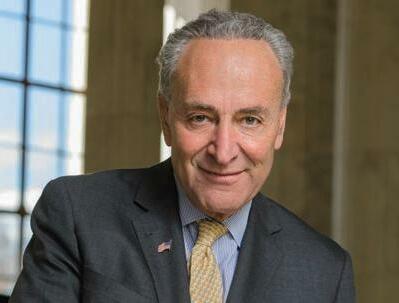
26 | CRAIN’S NEW YORK BUSINESS | DECEMBER 19, 2022
Advertising Section
Tuesday, Jan. 17 | 9-10:30 AM BREAK FA ST CRAIN’S NEW YORK BUSINESS FA ST RK BUSINESS Register Now! CrainsNewYork.com/PB_Schumer U.S.
Be where news happens
Senator Charles E. Schumer New York
Get your message in front of New York’s
community with
Advertising Section SUBMIT YOUR BUSINESS CLASSIFIEDS TODAY • Public and Legal Notices • Request For Proposals • Job Openings • Real Estate • Business Opportunities • Event Listings and More!
influential business
Crain’s New YorkBusiness - Classified Ads
EVANS BERNSTEIN says Caraway teaches navigating the health care landscape as a life skill.
Caring
RESIDES Upper East Side
EDUCATION Bachelor’s in biology, Ohio Wesleyan University; master’s in public health and health policy, the George Washington University School of Medicine and Health Sciences
VOLUNTEER WORK Evans Bernstein is a board member at Sanctuary for Families, one of the city’s biggest advocacy organizations for survivors of domestic violence, sex traf cking and gender violence. She said she is passionate about the issues the organization is trying to tackle.
COVID HOBBIES Evans Bernstein loves cooking and picked up a lot of new recipes with her kids at the beginning of the pandemic. They would make their own pasta and sushi.
BY JACQUELINE NEBER
Understanding people’s health needs has been a guiding principle of Lori Evans Bernstein’s career.
She has sought to use her creativity and self-starting spirit to think of new ways of delivering care.
Earlier in her career, from 2007 to 2009, Evans Bernstein served as the deputy commissioner of the state Health Department, where she led the O ce of Health Information Technology Transformation and launched two public-private partnerships to push health-tech forward throughout the state.
A few years later, in 2015, she co-founded HeathReveal, an articial intelligence–based platform that helps clinicians deliver services to patients with chronic diseases. “I've always been interested in health care and how technology and digital tools can support quality improvement and cost reduc-
tion,” Evans Bernstein said.

She made those tenets part of HealthReveal’s mission. e startup raised nearly $38 million and was acquired by Accolade in 2021.
Driving change
Now she has turned her entrepreneurial eye toward young New Yorkers.
In January Evans Bernstein co-founded Caraway, an app that connects students and New Yorkers ages 18 to 27 to services. e company employs adolescent medicine physicians, gynecologists and psychologists, who have recently started seeing patients.
Being able to access reproductive and mental health care is topof-mind for students, Evans Bernstein said, so the company is aiming to make such services available to anyone who downloads the app. In addition, long waits for urgent care appointments as well as an overwhelming amount of infor-
mation—and providers to choose from—have hindered young New Yorkers, she said. So she set out to change that.
Caraway has raised $10.5 million to date and has ambassadors working to raise awareness of the app on 24 area campuses, including Columbia, Cornell, several SUNY and CUNY sites, Vassar and NYU, among others. e app is available in California, Ohio and North Carolina as well, and will be expanding nationally in 2023.
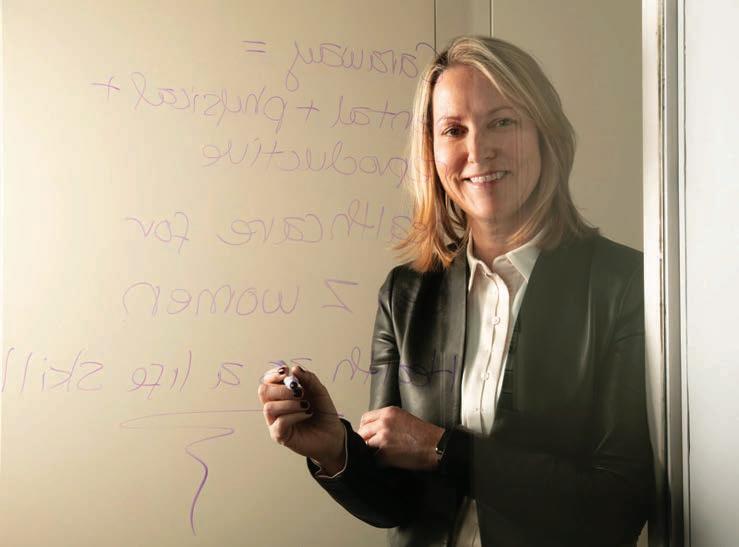
Patients can get a free trial of the app until the end of this month. After that, membership fees run $20 per month, a price point she thinks keeps it accessible for students on a budget. Evans Bernstein and her team also look to work with insurers to get services covered.
“We felt such a sense of urgency to address the health care crises college students are facing,” she said.
In that same vein, helping young
New Yorkers develop their own methods for navigating the health care system is crucial for her.
Caraway “teaches health as a life skill,” she said, “and supports gaining agency and independence. We think that’s the way that we’re going to bring Gen Z and college women up and out of these multiple health care crises, but also how we’re going to help drive systemic change to the health care system overall.”
DECEMBER 19, 2022 | CRAIN’S NEW YORK BUSINESS | 27
BUCK ENNIS
GREW UP Darnestown, Maryland
LORI EVANS
BERNSTEIN
■
for college-age
Health-tech entrepreneur seeks to give young people more access to services GOTHAM GIGS
New Yorkers
“WE
FELT SUCH A SENSE OF URGENCY TO ADDRESS THE CRISES STUDENTS ARE FACING”
The Best Outcomes for All. Every Patient. Every Community.
NYU Langone Health is the nation’s leading health system for quality and safety. We believe that every that patient deserves the best outcomes. No exceptions. It’s a philosophy that drives everything we do. You can see it in our rankings. You can see it in our major community contributions. And you can see it in the communities where we provide care.
Our percentage of Medicaid patients is among the highest in New York City. Nearly twothirds of our inpatients are enrolled in a government-sponsored insurance plan. And last year alone, our community benefit contribution totaled $1.3 billion. Our mission only works if it works for everyone.
Source: 2022 Vizient Quality and Accountability Ranking; Ranked #1 out of 107 participating comprehensive academic medical centers
NYC Hospitals with the Highest Medicaid Patient Volume 1. New York-Presbyterian Hospital 2. Montefiore Hospital & Medical Center 3. NYU Medical Center 4. Northwell-Long Island Jewish 5. Maimonides Medical Center 6. Mount Sinai Hospital 7. BronxCare Hospital Center 8. Northwell-Staten Island University Hospital 9. One Brooklyn Health (Brookdale, Interfaith) 10. Mount Sinai - Morningside / West 11. NYC H+H/Bellevue Source:
Cost Reports
NYU Langone Community Benefit Contribution $715.3 Million $33.02 Million Charity and Underfunded Care Community Health Contributions $534.1 Million Scan to find an NYU Langone doctor in your community. Physician Training and Research Support Source: NYU Langone Health, 2021 $1.3 Billion
NYS Dept of Health, 2019 Institutional
(ICRs), Medicaid–Eligible Discharges













 BY ROSS BARKAN
BY ROSS BARKAN



















































































 RINKU BHATTACHARYA
RINKU BHATTACHARYA
 RAY CHAO
RAY CHAO





 CLIFF CHOW
CLIFF CHOW





































 Weil, Gotshal & Manges
Weil, Gotshal & Manges

 BIPIN SUBEDI
BIPIN SUBEDI

















